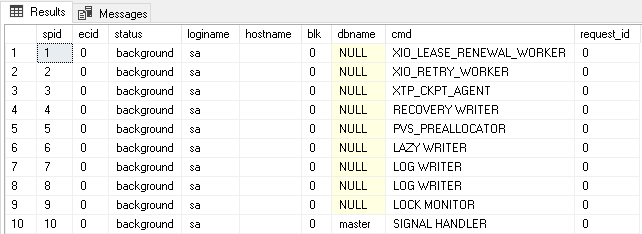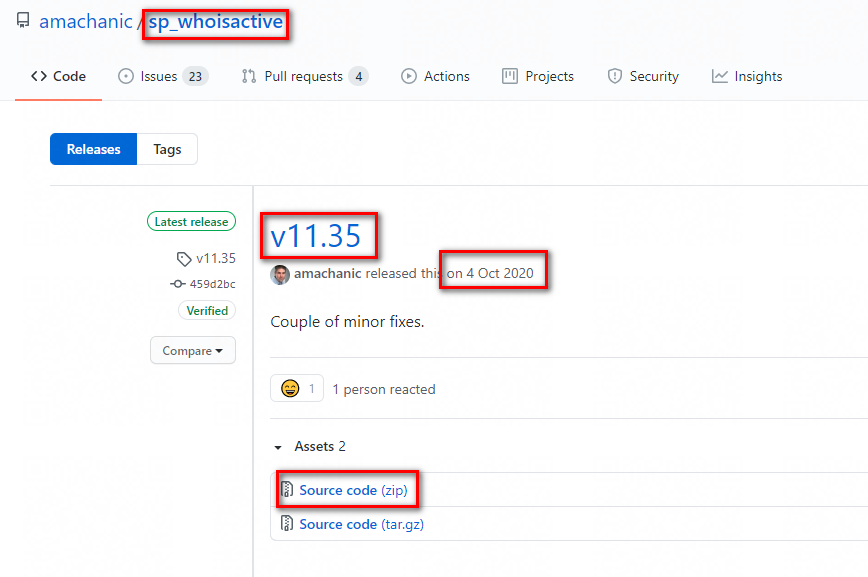一.常见简便的方式
通常,dba使用sp_who和sp_who2%ignore_a_1%存储过程或活动监视器来查看sql实例中的当前会话、用户和进程。 我们还可以从这些过程中确定阻塞会话和活动会话。
1.1. sp_who 如下:

1.2 sp_who2 如下:

1.3 通过sql server活动监视器(sql server activity monitor)

进程窗格如下

二. sp_whoisactive
这些过程没有提供太多有用的信息,例如等待信息,执行计划,当前运行的语句,持续时间。 现在,让我介绍另一个有用的存储过程sp_whoisactive,以获取sql server用户进程的即时视图。 它由microsoft mvpadam machanic开发。 我们可以从sql server 2005开始使用此存储过程。 您可以参考的官方文档。 它从各种dmv收集数据,并以表格格式显示信息。
这是一个自定义存储过程。 我们可以从github下载最新版本。 当前版本是11.35。 打开url并下载其zip版本。

其完整代码如下:
set quoted_identifier on; set ansi_padding on; set concat_null_yields_null on; set ansi_warnings on; set numeric_roundabort off; set arithabort on; go if not exists (select * from information_schema.routines where routine_name = \’sp_whoisactive\’) exec (\’create proc dbo.sp_whoisactive as select \’\’stub version, to be replaced\’\’\’) go /********************************************************************************************* who is active? v11.35 (2020-10-04) (c) 2007-2020, adam machanic feedback: mailto:adam@dataeducation.com updates: http://whoisactive.com blog: http://dataeducation.com license: https://github.com/amachanic/sp_whoisactive/blob/master/license *********************************************************************************************/ alter proc dbo.sp_whoisactive ( –~ –filters–both inclusive and exclusive –set either filter to \’\’ to disable –valid filter types are: session, program, database, login, and host –session is a session id, and either 0 or \’\’ can be used to indicate \”all\” sessions –all other filter types support % or _ as wildcards @filter sysname = \’\’, @filter_type varchar(10) = \’session\’, @not_filter sysname = \’\’, @not_filter_type varchar(10) = \’session\’, –retrieve data about the calling session? @show_own_spid bit = 0, –retrieve data about system sessions? @show_system_spids bit = 0, –controls how sleeping spids are handled, based on the idea of levels of interest –0 does not pull any sleeping spids –1 pulls only those sleeping spids that also have an open transaction –2 pulls all sleeping spids @show_sleeping_spids tinyint = 1, –if 1, gets the full stored procedure or running batch, when available –if 0, gets only the actual statement that is currently running in the batch or procedure @get_full_inner_text bit = 0, –get associated query plans for running tasks, if available –if @get_plans = 1, gets the plan based on the request\’s statement offset –if @get_plans = 2, gets the entire plan based on the request\’s plan_handle @get_plans tinyint = 0, –get the associated outer ad hoc query or stored procedure call, if available @get_outer_command bit = 0, –enables pulling transaction log write info and transaction duration @get_transaction_info bit = 0, –get information on active tasks, based on three interest levels –level 0 does not pull any task-related information –level 1 is a lightweight mode that pulls the top non-cxpacket wait, giving preference to blockers –level 2 pulls all available task-based metrics, including: –number of active tasks, current wait stats, physical i/o, context switches, and blocker information @get_task_info tinyint = 1, –gets associated locks for each request, aggregated in an xml format @get_locks bit = 0, –get average time for past runs of an active query –(based on the combination of plan handle, sql handle, and offset) @get_avg_time bit = 0, –get additional non-performance-related information about the session or request –text_size, language, date_format, date_first, quoted_identifier, arithabort, ansi_null_dflt_on, –ansi_defaults, ansi_warnings, ansi_padding, ansi_nulls, concat_null_yields_null, –transaction_isolation_level, lock_timeout, deadlock_priority, row_count, command_type — –if a sql agent job is running, an subnode called agent_info will be populated with some or all of –the following: job_id, job_name, step_id, step_name, msdb_query_error (in the event of an error) — –if @get_task_info is set to 2 and a lock wait is detected, a subnode called block_info will be –populated with some or all of the following: lock_type, database_name, object_id, file_id, hobt_id, –applock_hash, metadata_resource, metadata_class_id, object_name, schema_name @get_additional_info bit = 0, –walk the blocking chain and count the number of –total spids blocked all the way down by a given session –also enables task_info level 1, if @get_task_info is set to 0 @find_block_leaders bit = 0, –pull deltas on various metrics –interval in seconds to wait before doing the second data pull @delta_interval tinyint = 0, –list of desired output columns, in desired order –note that the final output will be the intersection of all enabled features and all –columns in the list. therefore, only columns associated with enabled features will –actually appear in the output. likewise, removing columns from this list may effectively –disable features, even if they are turned on — –each element in this list must be one of the valid output column names. names must be –delimited by square brackets. white space, formatting, and additional characters are –allowed, as long as the list contains exact matches of delimited valid column names. @output_column_list varchar(8000) = \'[dd%][session_id][sql_text][sql_command][login_name][wait_info][tasks][tran_log%][cpu%][temp%][block%][reads%][writes%][context%][physical%][query_plan][locks][%]\’, –column(s) by which to sort output, optionally with sort directions. –valid column choices: –session_id, physical_io, reads, physical_reads, writes, tempdb_allocations, –tempdb_current, cpu, context_switches, used_memory, physical_io_delta, reads_delta, –physical_reads_delta, writes_delta, tempdb_allocations_delta, tempdb_current_delta, –cpu_delta, context_switches_delta, used_memory_delta, tasks, tran_start_time, –open_tran_count, blocking_session_id, blocked_session_count, percent_complete, –host_name, login_name, database_name, start_time, login_time, program_name — –note that column names in the list must be bracket-delimited. commas and/or white –space are not required. @sort_order varchar(500) = \'[start_time] asc\’, –formats some of the output columns in a more \”human readable\” form –0 disables outfput format –1 formats the output for variable-width fonts –2 formats the output for fixed-width fonts @format_output tinyint = 1, –if set to a non-blank value, the script will attempt to insert into the specified –destination table. please note that the script will not verify that the table exists, –or that it has the correct schema, before doing the insert. –table can be specified in one, two, or three-part format @destination_table varchar(4000) = \’\’, –if set to 1, no data collection will happen and no result set will be returned; instead, –a create table statement will be returned via the @schema parameter, which will match –the schema of the result set that would be returned by using the same collection of the –rest of the parameters. the create table statement will have a placeholder token of –<table_name> in place of an actual table name. @return_schema bit = 0, @schema varchar(max) = null output, –help! what do i do? @help bit = 0 –~ ) /* output columns ————– formatted/non: [session_id] [smallint] not null session id (a.k.a. spid) formatted: [dd hh:mm:ss.mss] [varchar](15) null non-formatted: <not returned> for an active request, time the query has been running for a sleeping session, time since the last batch completed formatted: [dd hh:mm:ss.mss (avg)] [varchar](15) null non-formatted: [avg_elapsed_time] [int] null (requires @get_avg_time option) how much time has the active portion of the query taken in the past, on average? formatted: [physical_io] [varchar](30) null non-formatted: [physical_io] [bigint] null shows the number of physical i/os, for active requests formatted: [reads] [varchar](30) null non-formatted: [reads] [bigint] null for an active request, number of reads done for the current query for a sleeping session, total number of reads done over the lifetime of the session formatted: [physical_reads] [varchar](30) null non-formatted: [physical_reads] [bigint] null for an active request, number of physical reads done for the current query for a sleeping session, total number of physical reads done over the lifetime of the session formatted: [writes] [varchar](30) null non-formatted: [writes] [bigint] null for an active request, number of writes done for the current query for a sleeping session, total number of writes done over the lifetime of the session formatted: [tempdb_allocations] [varchar](30) null non-formatted: [tempdb_allocations] [bigint] null for an active request, number of tempdb writes done for the current query for a sleeping session, total number of tempdb writes done over the lifetime of the session formatted: [tempdb_current] [varchar](30) null non-formatted: [tempdb_current] [bigint] null for an active request, number of tempdb pages currently allocated for the query for a sleeping session, number of tempdb pages currently allocated for the session formatted: [cpu] [varchar](30) null non-formatted: [cpu] [int] null for an active request, total cpu time consumed by the current query for a sleeping session, total cpu time consumed over the lifetime of the session formatted: [context_switches] [varchar](30) null non-formatted: [context_switches] [bigint] null shows the number of context switches, for active requests formatted: [used_memory] [varchar](30) not null non-formatted: [used_memory] [bigint] not null for an active request, total memory consumption for the current query for a sleeping session, total current memory consumption formatted: [physical_io_delta] [varchar](30) null non-formatted: [physical_io_delta] [bigint] null (requires @delta_interval option) difference between the number of physical i/os reported on the first and second collections. if the request started after the first collection, the value will be null formatted: [reads_delta] [varchar](30) null non-formatted: [reads_delta] [bigint] null (requires @delta_interval option) difference between the number of reads reported on the first and second collections. if the request started after the first collection, the value will be null formatted: [physical_reads_delta] [varchar](30) null non-formatted: [physical_reads_delta] [bigint] null (requires @delta_interval option) difference between the number of physical reads reported on the first and second collections. if the request started after the first collection, the value will be null formatted: [writes_delta] [varchar](30) null non-formatted: [writes_delta] [bigint] null (requires @delta_interval option) difference between the number of writes reported on the first and second collections. if the request started after the first collection, the value will be null formatted: [tempdb_allocations_delta] [varchar](30) null non-formatted: [tempdb_allocations_delta] [bigint] null (requires @delta_interval option) difference between the number of tempdb writes reported on the first and second collections. if the request started after the first collection, the value will be null formatted: [tempdb_current_delta] [varchar](30) null non-formatted: [tempdb_current_delta] [bigint] null (requires @delta_interval option) difference between the number of allocated tempdb pages reported on the first and second collections. if the request started after the first collection, the value will be null formatted: [cpu_delta] [varchar](30) null non-formatted: [cpu_delta] [int] null (requires @delta_interval option) difference between the cpu time reported on the first and second collections. if the request started after the first collection, the value will be null formatted: [context_switches_delta] [varchar](30) null non-formatted: [context_switches_delta] [bigint] null (requires @delta_interval option) difference between the context switches count reported on the first and second collections if the request started after the first collection, the value will be null formatted: [used_memory_delta] [varchar](30) null non-formatted: [used_memory_delta] [bigint] null difference between the memory usage reported on the first and second collections if the request started after the first collection, the value will be null formatted: [tasks] [varchar](30) null non-formatted: [tasks] [smallint] null number of worker tasks currently allocated, for active requests formatted/non: [status] [varchar](30) not null activity status for the session (running, sleeping, etc) formatted/non: [wait_info] [nvarchar](4000) null aggregates wait information, in the following format: (ax: bms/cms/dms)e a is the number of waiting tasks currently waiting on resource type e. b/c/d are wait times, in milliseconds. if only one thread is waiting, its wait time will be shown as b. if two tasks are waiting, each of their wait times will be shown (b/c). if three or more tasks are waiting, the minimum, average, and maximum wait times will be shown (b/c/d). if wait type e is a page latch wait and the page is of a \”special\” type (e.g. pfs, gam, sgam), the page type will be identified. if wait type e is cxpacket, the nodeid from the query plan will be identified formatted/non: [locks] [xml] null (requires @get_locks option) aggregates lock information, in xml format. the lock xml includes the lock mode, locked object, and aggregates the number of requests. attempts are made to identify locked objects by name formatted/non: [tran_start_time] [datetime] null (requires @get_transaction_info option) date and time that the first transaction opened by a session caused a transaction log write to occur. formatted/non: [tran_log_writes] [nvarchar](4000) null (requires @get_transaction_info option) aggregates transaction log write information, in the following format: a:wb (c kb) a is a database that has been touched by an active transaction b is the number of log writes that have been made in the database as a result of the transaction c is the number of log kilobytes consumed by the log records formatted: [open_tran_count] [varchar](30) null non-formatted: [open_tran_count] [smallint] null shows the number of open transactions the session has open formatted: [sql_command] [xml] null non-formatted: [sql_command] [nvarchar](max) null (requires @get_outer_command option) shows the \”outer\” sql command, i.e. the text of the batch or rpc sent to the server, if available formatted: [sql_text] [xml] null non-formatted: [sql_text] [nvarchar](max) null shows the sql text for active requests or the last statement executed for sleeping sessions, if available in either case. if @get_full_inner_text option is set, shows the full text of the batch. otherwise, shows only the active statement within the batch. if the query text is locked, a special timeout message will be sent, in the following format: <timeout_exceeded /> if an error occurs, an error message will be sent, in the following format: <error message=\”message\” /> formatted/non: [query_plan] [xml] null (requires @get_plans option) shows the query plan for the request, if available. if the plan is locked, a special timeout message will be sent, in the following format: <timeout_exceeded /> if an error occurs, an error message will be sent, in the following format: <error message=\”message\” /> formatted/non: [blocking_session_id] [smallint] null when applicable, shows the blocking spid formatted: [blocked_session_count] [varchar](30) null non-formatted: [blocked_session_count] [smallint] null (requires @find_block_leaders option) the total number of spids blocked by this session, all the way down the blocking chain. formatted: [percent_complete] [varchar](30) null non-formatted: [percent_complete] [real] null when applicable, shows the percent complete (e.g. for backups, restores, and some rollbacks) formatted/non: [host_name] [sysname] not null shows the host name for the connection formatted/non: [login_name] [sysname] not null shows the login name for the connection formatted/non: [database_name] [sysname] null shows the connected database formatted/non: [program_name] [sysname] null shows the reported program/application name formatted/non: [additional_info] [xml] null (requires @get_additional_info option) returns additional non-performance-related session/request information if the script finds a sql agent job running, the name of the job and job step will be reported if @get_task_info = 2 and the script finds a lock wait, the locked object will be reported formatted/non: [start_time] [datetime] not null for active requests, shows the time the request started for sleeping sessions, shows the time the last batch completed formatted/non: [login_time] [datetime] not null shows the time that the session connected formatted/non: [request_id] [int] null for active requests, shows the request_id should be 0 unless mars is being used formatted/non: [collection_time] [datetime] not null time that this script\’s final select ran */ as begin; set nocount on; set transaction isolation level read uncommitted; set quoted_identifier on; set ansi_padding on; set concat_null_yields_null on; set ansi_warnings on; set numeric_roundabort off; set arithabort on; if @filter is null or @filter_type is null or @not_filter is null or @not_filter_type is null or @show_own_spid is null or @show_system_spids is null or @show_sleeping_spids is null or @get_full_inner_text is null or @get_plans is null or @get_outer_command is null or @get_transaction_info is null or @get_task_info is null or @get_locks is null or @get_avg_time is null or @get_additional_info is null or @find_block_leaders is null or @delta_interval is null or @format_output is null or @output_column_list is null or @sort_order is null or @return_schema is null or @destination_table is null or @help is null begin; raiserror(\’input parameters cannot be null\’, 16, 1); return; end; if @filter_type not in (\’session\’, \’program\’, \’database\’, \’login\’, \’host\’) begin; raiserror(\’valid filter types are: session, program, database, login, host\’, 16, 1); return; end; if @filter_type = \’session\’ and @filter like \’%[^0123456789]%\’ begin; raiserror(\’session filters must be valid integers\’, 16, 1); return; end; if @not_filter_type not in (\’session\’, \’program\’, \’database\’, \’login\’, \’host\’) begin; raiserror(\’valid filter types are: session, program, database, login, host\’, 16, 1); return; end; if @not_filter_type = \’session\’ and @not_filter like \’%[^0123456789]%\’ begin; raiserror(\’session filters must be valid integers\’, 16, 1); return; end; if @show_sleeping_spids not in (0, 1, 2) begin; raiserror(\’valid values for @show_sleeping_spids are: 0, 1, or 2\’, 16, 1); return; end; if @get_plans not in (0, 1, 2) begin; raiserror(\’valid values for @get_plans are: 0, 1, or 2\’, 16, 1); return; end; if @get_task_info not in (0, 1, 2) begin; raiserror(\’valid values for @get_task_info are: 0, 1, or 2\’, 16, 1); return; end; if @format_output not in (0, 1, 2) begin; raiserror(\’valid values for @format_output are: 0, 1, or 2\’, 16, 1); return; end; if @help = 1 begin; declare @header varchar(max), @params varchar(max), @outputs varchar(max); select @header = replace ( replace ( convert ( varchar(max), substring ( t.text, charindex(\’/\’ + replicate(\’*\’, 93), t.text) + 94, charindex(replicate(\’*\’, 93) + \’/\’, t.text) – (charindex(\’/\’ + replicate(\’*\’, 93), t.text) + 94) ) ), char(13)+char(10), char(13) ), \’ \’, \’\’ ), @params = char(13) + replace ( replace ( convert ( varchar(max), substring ( t.text, charindex(\’–~\’, t.text) + 5, charindex(\’–~\’, t.text, charindex(\’–~\’, t.text) + 5) – (charindex(\’–~\’, t.text) + 5) ) ), char(13)+char(10), char(13) ), \’ \’, \’\’ ), @outputs = char(13) + replace ( replace ( replace ( convert ( varchar(max), substring ( t.text, charindex(\’output columns\’+char(13)+char(10)+\’————–\’, t.text) + 32, charindex(\’*/\’, t.text, charindex(\’output columns\’+char(13)+char(10)+\’————–\’, t.text) + 32) – (charindex(\’output columns\’+char(13)+char(10)+\’————–\’, t.text) + 32) ) ), char(9), char(255) ), char(13)+char(10), char(13) ), \’ \’, \’\’ ) + char(13) from sys.dm_exec_requests as r cross apply sys.dm_exec_sql_text(r.sql_handle) as t where r.session_id = @@spid; with a0 as (select 1 as n union all select 1), a1 as (select 1 as n from a0 as a cross join a0 as b), a2 as (select 1 as n from a1 as a cross join a1 as b), a3 as (select 1 as n from a2 as a cross join a2 as b), a4 as (select 1 as n from a3 as a cross join a3 as b), numbers as ( select top(len(@header) – 1) row_number() over ( order by (select null) ) as number from a4 order by number ) select rtrim(ltrim( substring ( @header, number + 1, charindex(char(13), @header, number + 1) – number – 1 ) )) as [——header—————————————————————————————————————] from numbers where substring(@header, number, 1) = char(13); with a0 as (select 1 as n union all select 1), a1 as (select 1 as n from a0 as a cross join a0 as b), a2 as (select 1 as n from a1 as a cross join a1 as b), a3 as (select 1 as n from a2 as a cross join a2 as b), a4 as (select 1 as n from a3 as a cross join a3 as b), numbers as ( select top(len(@params) – 1) row_number() over ( order by (select null) ) as number from a4 order by number ), tokens as ( select rtrim(ltrim( substring ( @params, number + 1, charindex(char(13), @params, number + 1) – number – 1 ) )) as token, number, case when substring(@params, number + 1, 1) = char(13) then number else coalesce(nullif(charindex(\’,\’ + char(13) + char(13), @params, number), 0), len(@params)) end as param_group, row_number() over ( partition by charindex(\’,\’ + char(13) + char(13), @params, number), substring(@params, number+1, 1) order by number ) as group_order from numbers where substring(@params, number, 1) = char(13) ), parsed_tokens as ( select min ( case when token like \’@%\’ then token else null end ) as parameter, min ( case when token like \’–%\’ then right(token, len(token) – 2) else null end ) as description, param_group, group_order from tokens where not ( token = \’\’ and group_order > 1 ) group by param_group, group_order ) select case when description is null and parameter is null then \’————————————————————————-\’ when param_group = max(param_group) over() then parameter else coalesce(left(parameter, len(parameter) – 1), \’\’) end as [——parameter———————————————————-], case when description is null and parameter is null then \’———————————————————————————————————————-\’ else coalesce(description, \’\’) end as [——description—————————————————————————————————–] from parsed_tokens order by param_group, group_order; with a0 as (select 1 as n union all select 1), a1 as (select 1 as n from a0 as a cross join a0 as b), a2 as (select 1 as n from a1 as a cross join a1 as b), a3 as (select 1 as n from a2 as a cross join a2 as b), a4 as (select 1 as n from a3 as a cross join a3 as b), numbers as ( select top(len(@outputs) – 1) row_number() over ( order by (select null) ) as number from a4 order by number ), tokens as ( select rtrim(ltrim( substring ( @outputs, number + 1, case when coalesce(nullif(charindex(char(13) + \’formatted\’, @outputs, number + 1), 0), len(@outputs)) < coalesce(nullif(charindex(char(13) + char(255) collate latin1_general_bin2, @outputs, number + 1), 0), len(@outputs)) then coalesce(nullif(charindex(char(13) + \’formatted\’, @outputs, number + 1), 0), len(@outputs)) – number – 1 else coalesce(nullif(charindex(char(13) + char(255) collate latin1_general_bin2, @outputs, number + 1), 0), len(@outputs)) – number – 1 end ) )) as token, number, coalesce(nullif(charindex(char(13) + \’formatted\’, @outputs, number + 1), 0), len(@outputs)) as output_group, row_number() over ( partition by coalesce(nullif(charindex(char(13) + \’formatted\’, @outputs, number + 1), 0), len(@outputs)) order by number ) as output_group_order from numbers where substring(@outputs, number, 10) = char(13) + \’formatted\’ or substring(@outputs, number, 2) = char(13) + char(255) collate latin1_general_bin2 ), output_tokens as ( select *, case output_group_order when 2 then max(case output_group_order when 1 then token else null end) over (partition by output_group) else \’\’ end collate latin1_general_bin2 as column_info from tokens ) select case output_group_order when 1 then \’———————————–\’ when 2 then case when charindex(\’formatted/non:\’, column_info) = 1 then substring(column_info, charindex(char(255) collate latin1_general_bin2, column_info)+1, charindex(\’]\’, column_info, charindex(char(255) collate latin1_general_bin2, column_info)+2) – charindex(char(255) collate latin1_general_bin2, column_info)) else substring(column_info, charindex(char(255) collate latin1_general_bin2, column_info)+2, charindex(\’]\’, column_info, charindex(char(255) collate latin1_general_bin2, column_info)+2) – charindex(char(255) collate latin1_general_bin2, column_info)-1) end else \’\’ end as formatted_column_name, case output_group_order when 1 then \’———————————–\’ when 2 then case when charindex(\’formatted/non:\’, column_info) = 1 then substring(column_info, charindex(\’]\’, column_info)+2, len(column_info)) else substring(column_info, charindex(\’]\’, column_info)+2, charindex(\’non-formatted:\’, column_info, charindex(\’]\’, column_info)+2) – charindex(\’]\’, column_info)-3) end else \’\’ end as formatted_column_type, case output_group_order when 1 then \’—————————————\’ when 2 then case when charindex(\’formatted/non:\’, column_info) = 1 then \’\’ else case when substring(column_info, charindex(char(255) collate latin1_general_bin2, column_info, charindex(\’non-formatted:\’, column_info))+1, 1) = \'<\’ then substring(column_info, charindex(char(255) collate latin1_general_bin2, column_info, charindex(\’non-formatted:\’, column_info))+1, charindex(\’>\’, column_info, charindex(char(255) collate latin1_general_bin2, column_info, charindex(\’non-formatted:\’, column_info))+1) – charindex(char(255) collate latin1_general_bin2, column_info, charindex(\’non-formatted:\’, column_info))) else substring(column_info, charindex(char(255) collate latin1_general_bin2, column_info, charindex(\’non-formatted:\’, column_info))+1, charindex(\’]\’, column_info, charindex(char(255) collate latin1_general_bin2, column_info, charindex(\’non-formatted:\’, column_info))+1) – charindex(char(255) collate latin1_general_bin2, column_info, charindex(\’non-formatted:\’, column_info))) end end else \’\’ end as unformatted_column_name, case output_group_order when 1 then \’—————————————\’ when 2 then case when charindex(\’formatted/non:\’, column_info) = 1 then \’\’ else case when substring(column_info, charindex(char(255) collate latin1_general_bin2, column_info, charindex(\’non-formatted:\’, column_info))+1, 1) = \'<\’ then \’\’ else substring(column_info, charindex(\’]\’, column_info, charindex(\’non-formatted:\’, column_info))+2, charindex(\’non-formatted:\’, column_info, charindex(\’]\’, column_info)+2) – charindex(\’]\’, column_info)-3) end end else \’\’ end as unformatted_column_type, case output_group_order when 1 then \’———————————————————————————————————————-\’ else replace(token, char(255) collate latin1_general_bin2, \’\’) end as [——description—————————————————————————————————–] from output_tokens where not ( output_group_order = 1 and output_group = len(@outputs) ) order by output_group, case output_group_order when 1 then 99 else output_group_order end; return; end; with a0 as (select 1 as n union all select 1), a1 as (select 1 as n from a0 as a cross join a0 as b), a2 as (select 1 as n from a1 as a cross join a1 as b), a3 as (select 1 as n from a2 as a cross join a2 as b), a4 as (select 1 as n from a3 as a cross join a3 as b), numbers as ( select top(len(@output_column_list)) row_number() over ( order by (select null) ) as number from a4 order by number ), tokens as ( select \’|[\’ + substring ( @output_column_list, number + 1, charindex(\’]\’, @output_column_list, number) – number – 1 ) + \’|]\’ as token, number from numbers where substring(@output_column_list, number, 1) = \'[\’ ), ordered_columns as ( select x.column_name, row_number() over ( partition by x.column_name order by tokens.number, x.default_order ) as r, row_number() over ( order by tokens.number, x.default_order ) as s from tokens join ( select \'[session_id]\’ as column_name, 1 as default_order union all select \'[dd hh:mm:ss.mss]\’, 2 where @format_output in (1, 2) union all select \'[dd hh:mm:ss.mss (avg)]\’, 3 where @format_output in (1, 2) and @get_avg_time = 1 union all select \'[avg_elapsed_time]\’, 4 where @format_output = 0 and @get_avg_time = 1 union all select \'[physical_io]\’, 5 where @get_task_info = 2 union all select \'[reads]\’, 6 union all select \'[physical_reads]\’, 7 union all select \'[writes]\’, 8 union all select \'[tempdb_allocations]\’, 9 union all select \'[tempdb_current]\’, 10 union all select \'[cpu]\’, 11 union all select \'[context_switches]\’, 12 where @get_task_info = 2 union all select \'[used_memory]\’, 13 union all select \'[physical_io_delta]\’, 14 where @delta_interval > 0 and @get_task_info = 2 union all select \'[reads_delta]\’, 15 where @delta_interval > 0 union all select \'[physical_reads_delta]\’, 16 where @delta_interval > 0 union all select \'[writes_delta]\’, 17 where @delta_interval > 0 union all select \'[tempdb_allocations_delta]\’, 18 where @delta_interval > 0 union all select \'[tempdb_current_delta]\’, 19 where @delta_interval > 0 union all select \'[cpu_delta]\’, 20 where @delta_interval > 0 union all select \'[context_switches_delta]\’, 21 where @delta_interval > 0 and @get_task_info = 2 union all select \'[used_memory_delta]\’, 22 where @delta_interval > 0 union all select \'[tasks]\’, 23 where @get_task_info = 2 union all select \'[status]\’, 24 union all select \'[wait_info]\’, 25 where @get_task_info > 0 or @find_block_leaders = 1 union all select \'[locks]\’, 26 where @get_locks = 1 union all select \'[tran_start_time]\’, 27 where @get_transaction_info = 1 union all select \'[tran_log_writes]\’, 28 where @get_transaction_info = 1 union all select \'[open_tran_count]\’, 29 union all select \'[sql_command]\’, 30 where @get_outer_command = 1 union all select \'[sql_text]\’, 31 union all select \'[query_plan]\’, 32 where @get_plans >= 1 union all select \'[blocking_session_id]\’, 33 where @get_task_info > 0 or @find_block_leaders = 1 union all select \'[blocked_session_count]\’, 34 where @find_block_leaders = 1 union all select \'[percent_complete]\’, 35 union all select \'[host_name]\’, 36 union all select \'[login_name]\’, 37 union all select \'[database_name]\’, 38 union all select \'[program_name]\’, 39 union all select \'[additional_info]\’, 40 where @get_additional_info = 1 union all select \'[start_time]\’, 41 union all select \'[login_time]\’, 42 union all select \'[request_id]\’, 43 union all select \'[collection_time]\’, 44 ) as x on x.column_name like token escape \’|\’ ) select @output_column_list = stuff ( ( select \’,\’ + column_name as [text()] from ordered_columns where r = 1 order by s for xml path(\’\’) ), 1, 1, \’\’ ); if coalesce(rtrim(@output_column_list), \’\’) = \’\’ begin; raiserror(\’no valid column matches found in @output_column_list or no columns remain due to selected options.\’, 16, 1); return; end; if @destination_table <> \’\’ begin; set @destination_table = –database coalesce(quotename(parsename(@destination_table, 3)) + \’.\’, \’\’) + –schema coalesce(quotename(parsename(@destination_table, 2)) + \’.\’, \’\’) + –table coalesce(quotename(parsename(@destination_table, 1)), \’\’); if coalesce(rtrim(@destination_table), \’\’) = \’\’ begin; raiserror(\’destination table not properly formatted.\’, 16, 1); return; end; end; with a0 as (select 1 as n union all select 1), a1 as (select 1 as n from a0 as a cross join a0 as b), a2 as (select 1 as n from a1 as a cross join a1 as b), a3 as (select 1 as n from a2 as a cross join a2 as b), a4 as (select 1 as n from a3 as a cross join a3 as b), numbers as ( select top(len(@sort_order)) row_number() over ( order by (select null) ) as number from a4 order by number ), tokens as ( select \’|[\’ + substring ( @sort_order, number + 1, charindex(\’]\’, @sort_order, number) – number – 1 ) + \’|]\’ as token, substring ( @sort_order, charindex(\’]\’, @sort_order, number) + 1, coalesce(nullif(charindex(\'[\’, @sort_order, charindex(\’]\’, @sort_order, number)), 0), len(@sort_order)) – charindex(\’]\’, @sort_order, number) ) as next_chunk, number from numbers where substring(@sort_order, number, 1) = \'[\’ ), ordered_columns as ( select x.column_name + case when lower(tokens.next_chunk) like \’%asc%\’ then \’ asc\’ when lower(tokens.next_chunk) like \’%desc%\’ then \’ desc\’ else \’\’ end as column_name, row_number() over ( partition by x.column_name order by tokens.number ) as r, tokens.number from tokens join ( select \'[session_id]\’ as column_name union all select \'[physical_io]\’ union all select \'[reads]\’ union all select \'[physical_reads]\’ union all select \'[writes]\’ union all select \'[tempdb_allocations]\’ union all select \'[tempdb_current]\’ union all select \'[cpu]\’ union all select \'[context_switches]\’ union all select \'[used_memory]\’ union all select \'[physical_io_delta]\’ union all select \'[reads_delta]\’ union all select \'[physical_reads_delta]\’ union all select \'[writes_delta]\’ union all select \'[tempdb_allocations_delta]\’ union all select \'[tempdb_current_delta]\’ union all select \'[cpu_delta]\’ union all select \'[context_switches_delta]\’ union all select \'[used_memory_delta]\’ union all select \'[tasks]\’ union all select \'[tran_start_time]\’ union all select \'[open_tran_count]\’ union all select \'[blocking_session_id]\’ union all select \'[blocked_session_count]\’ union all select \'[percent_complete]\’ union all select \'[host_name]\’ union all select \'[login_name]\’ union all select \'[database_name]\’ union all select \'[start_time]\’ union all select \'[login_time]\’ union all select \'[program_name]\’ ) as x on x.column_name like token escape \’|\’ ) select @sort_order = coalesce(z.sort_order, \’\’) from ( select stuff ( ( select \’,\’ + column_name as [text()] from ordered_columns where r = 1 order by number for xml path(\’\’) ), 1, 1, \’\’ ) as sort_order ) as z; create table #sessions ( recursion smallint not null, session_id smallint not null, request_id int not null, session_number int not null, elapsed_time int not null, avg_elapsed_time int null, physical_io bigint null, reads bigint null, physical_reads bigint null, writes bigint null, tempdb_allocations bigint null, tempdb_current bigint null, cpu int null, thread_cpu_snapshot bigint null, context_switches bigint null, used_memory bigint not null, tasks smallint null, status varchar(30) not null, wait_info nvarchar(4000) null, locks xml null, transaction_id bigint null, tran_start_time datetime null, tran_log_writes nvarchar(4000) null, open_tran_count smallint null, sql_command xml null, sql_handle varbinary(64) null, statement_start_offset int null, statement_end_offset int null, sql_text xml null, plan_handle varbinary(64) null, query_plan xml null, blocking_session_id smallint null, blocked_session_count smallint null, percent_complete real null, host_name sysname null, login_name sysname not null, database_name sysname null, program_name sysname null, additional_info xml null, start_time datetime not null, login_time datetime null, last_request_start_time datetime null, primary key clustered (session_id, request_id, recursion) with (ignore_dup_key = on), unique nonclustered (transaction_id, session_id, request_id, recursion) with (ignore_dup_key = on) ); if @return_schema = 0 begin; –disable unnecessary autostats on the table create statistics s_session_id on #sessions (session_id) with sample 0 rows, norecompute; create statistics s_request_id on #sessions (request_id) with sample 0 rows, norecompute; create statistics s_transaction_id on #sessions (transaction_id) with sample 0 rows, norecompute; create statistics s_session_number on #sessions (session_number) with sample 0 rows, norecompute; create statistics s_status on #sessions (status) with sample 0 rows, norecompute; create statistics s_start_time on #sessions (start_time) with sample 0 rows, norecompute; create statistics s_last_request_start_time on #sessions (last_request_start_time) with sample 0 rows, norecompute; create statistics s_recursion on #sessions (recursion) with sample 0 rows, norecompute; declare @recursion smallint; set @recursion = case @delta_interval when 0 then 1 else -1 end; declare @first_collection_ms_ticks bigint; declare @last_collection_start datetime; declare @sys_info bit; set @sys_info = isnull(convert(bit, sign(object_id(\’sys.dm_os_sys_info\’))), 0); –used for the delta pull redo:; if @get_locks = 1 and @recursion = 1 and @output_column_list like \’%|[locks|]%\’ escape \’|\’ begin; select y.resource_type, y.database_name, y.object_id, y.file_id, y.page_type, y.hobt_id, y.allocation_unit_id, y.index_id, y.schema_id, y.principal_id, y.request_mode, y.request_status, y.session_id, y.resource_description, y.request_count, s.request_id, s.start_time, convert(sysname, null) as object_name, convert(sysname, null) as index_name, convert(sysname, null) as schema_name, convert(sysname, null) as principal_name, convert(nvarchar(2048), null) as query_error into #locks from ( select sp.spid as session_id, case sp.status when \’sleeping\’ then convert(int, 0) else sp.request_id end as request_id, case sp.status when \’sleeping\’ then sp.last_batch else coalesce(req.start_time, sp.last_batch) end as start_time, sp.dbid from sys.sysprocesses as sp outer apply ( select top(1) case when ( sp.hostprocess > \’\’ or r.total_elapsed_time < 0 ) then r.start_time else dateadd ( ms, 1000 * (datepart(ms, dateadd(second, -(r.total_elapsed_time / 1000), getdate())) / 500) – datepart(ms, dateadd(second, -(r.total_elapsed_time / 1000), getdate())), dateadd(second, -(r.total_elapsed_time / 1000), getdate()) ) end as start_time from sys.dm_exec_requests as r where r.session_id = sp.spid and r.request_id = sp.request_id ) as req where –process inclusive filter 1 = case when @filter <> \’\’ then case @filter_type when \’session\’ then case when convert(smallint, @filter) = 0 or sp.spid = convert(smallint, @filter) then 1 else 0 end when \’program\’ then case when sp.program_name like @filter then 1 else 0 end when \’login\’ then case when sp.loginame like @filter then 1 else 0 end when \’host\’ then case when sp.hostname like @filter then 1 else 0 end when \’database\’ then case when db_name(sp.dbid) like @filter then 1 else 0 end else 0 end else 1 end –process exclusive filter and 0 = case when @not_filter <> \’\’ then case @not_filter_type when \’session\’ then case when sp.spid = convert(smallint, @not_filter) then 1 else 0 end when \’program\’ then case when sp.program_name like @not_filter then 1 else 0 end when \’login\’ then case when sp.loginame like @not_filter then 1 else 0 end when \’host\’ then case when sp.hostname like @not_filter then 1 else 0 end when \’database\’ then case when db_name(sp.dbid) like @not_filter then 1 else 0 end else 0 end else 0 end and ( @show_own_spid = 1 or sp.spid <> @@spid ) and ( @show_system_spids = 1 or sp.hostprocess > \’\’ ) and sp.ecid = 0 ) as s inner hash join ( select x.resource_type, x.database_name, x.object_id, x.file_id, case when x.page_no = 1 or x.page_no % 8088 = 0 then \’pfs\’ when x.page_no = 2 or x.page_no % 511232 = 0 then \’gam\’ when x.page_no = 3 or (x.page_no – 1) % 511232 = 0 then \’sgam\’ when x.page_no = 6 or (x.page_no – 6) % 511232 = 0 then \’dcm\’ when x.page_no = 7 or (x.page_no – 7) % 511232 = 0 then \’bcm\’ when x.page_no is not null then \’*\’ else null end as page_type, x.hobt_id, x.allocation_unit_id, x.index_id, x.schema_id, x.principal_id, x.request_mode, x.request_status, x.session_id, x.request_id, case when coalesce(x.object_id, x.file_id, x.hobt_id, x.allocation_unit_id, x.index_id, x.schema_id, x.principal_id) is null then nullif(resource_description, \’\’) else null end as resource_description, count(*) as request_count from ( select tl.resource_type + case when tl.resource_subtype = \’\’ then \’\’ else \’.\’ + tl.resource_subtype end as resource_type, coalesce(db_name(tl.resource_database_id), n\'(null)\’) as database_name, convert ( int, case when tl.resource_type = \’object\’ then tl.resource_associated_entity_id when tl.resource_description like \’%object_id = %\’ then ( substring ( tl.resource_description, (charindex(\’object_id = \’, tl.resource_description) + 12), coalesce ( nullif ( charindex(\’,\’, tl.resource_description, charindex(\’object_id = \’, tl.resource_description) + 12), 0 ), datalength(tl.resource_description)+1 ) – (charindex(\’object_id = \’, tl.resource_description) + 12) ) ) else null end ) as object_id, convert ( int, case when tl.resource_type = \’file\’ then convert(int, tl.resource_description) when tl.resource_type in (\’page\’, \’extent\’, \’rid\’) then left(tl.resource_description, charindex(\’:\’, tl.resource_description)-1) else null end ) as file_id, convert ( int, case when tl.resource_type in (\’page\’, \’extent\’, \’rid\’) then substring ( tl.resource_description, charindex(\’:\’, tl.resource_description) + 1, coalesce ( nullif ( charindex(\’:\’, tl.resource_description, charindex(\’:\’, tl.resource_description) + 1), 0 ), datalength(tl.resource_description)+1 ) – (charindex(\’:\’, tl.resource_description) + 1) ) else null end ) as page_no, case when tl.resource_type in (\’page\’, \’key\’, \’rid\’, \’hobt\’) then tl.resource_associated_entity_id else null end as hobt_id, case when tl.resource_type = \’allocation_unit\’ then tl.resource_associated_entity_id else null end as allocation_unit_id, convert ( int, case when /*todo: deal with server principals*/ tl.resource_subtype <> \’server_principal\’ and tl.resource_description like \’%index_id or stats_id = %\’ then ( substring ( tl.resource_description, (charindex(\’index_id or stats_id = \’, tl.resource_description) + 23), coalesce ( nullif ( charindex(\’,\’, tl.resource_description, charindex(\’index_id or stats_id = \’, tl.resource_description) + 23), 0 ), datalength(tl.resource_description)+1 ) – (charindex(\’index_id or stats_id = \’, tl.resource_description) + 23) ) ) else null end ) as index_id, convert ( int, case when tl.resource_description like \’%schema_id = %\’ then ( substring ( tl.resource_description, (charindex(\’schema_id = \’, tl.resource_description) + 12), coalesce ( nullif ( charindex(\’,\’, tl.resource_description, charindex(\’schema_id = \’, tl.resource_description) + 12), 0 ), datalength(tl.resource_description)+1 ) – (charindex(\’schema_id = \’, tl.resource_description) + 12) ) ) else null end ) as schema_id, convert ( int, case when tl.resource_description like \’%principal_id = %\’ then ( substring ( tl.resource_description, (charindex(\’principal_id = \’, tl.resource_description) + 15), coalesce ( nullif ( charindex(\’,\’, tl.resource_description, charindex(\’principal_id = \’, tl.resource_description) + 15), 0 ), datalength(tl.resource_description)+1 ) – (charindex(\’principal_id = \’, tl.resource_description) + 15) ) ) else null end ) as principal_id, tl.request_mode, tl.request_status, tl.request_session_id as session_id, tl.request_request_id as request_id, /*todo: applocks, other resource_descriptions*/ rtrim(tl.resource_description) as resource_description, tl.resource_associated_entity_id /*********************************************/ from ( select request_session_id, convert(varchar(120), resource_type) collate latin1_general_bin2 as resource_type, convert(varchar(120), resource_subtype) collate latin1_general_bin2 as resource_subtype, resource_database_id, convert(varchar(512), resource_description) collate latin1_general_bin2 as resource_description, resource_associated_entity_id, convert(varchar(120), request_mode) collate latin1_general_bin2 as request_mode, convert(varchar(120), request_status) collate latin1_general_bin2 as request_status, request_request_id from sys.dm_tran_locks ) as tl ) as x group by x.resource_type, x.database_name, x.object_id, x.file_id, case when x.page_no = 1 or x.page_no % 8088 = 0 then \’pfs\’ when x.page_no = 2 or x.page_no % 511232 = 0 then \’gam\’ when x.page_no = 3 or (x.page_no – 1) % 511232 = 0 then \’sgam\’ when x.page_no = 6 or (x.page_no – 6) % 511232 = 0 then \’dcm\’ when x.page_no = 7 or (x.page_no – 7) % 511232 = 0 then \’bcm\’ when x.page_no is not null then \’*\’ else null end, x.hobt_id, x.allocation_unit_id, x.index_id, x.schema_id, x.principal_id, x.request_mode, x.request_status, x.session_id, x.request_id, case when coalesce(x.object_id, x.file_id, x.hobt_id, x.allocation_unit_id, x.index_id, x.schema_id, x.principal_id) is null then nullif(resource_description, \’\’) else null end ) as y on y.session_id = s.session_id and y.request_id = s.request_id option (hash group); –disable unnecessary autostats on the table create statistics s_database_name on #locks (database_name) with sample 0 rows, norecompute; create statistics s_object_id on #locks (object_id) with sample 0 rows, norecompute; create statistics s_hobt_id on #locks (hobt_id) with sample 0 rows, norecompute; create statistics s_allocation_unit_id on #locks (allocation_unit_id) with sample 0 rows, norecompute; create statistics s_index_id on #locks (index_id) with sample 0 rows, norecompute; create statistics s_schema_id on #locks (schema_id) with sample 0 rows, norecompute; create statistics s_principal_id on #locks (principal_id) with sample 0 rows, norecompute; create statistics s_request_id on #locks (request_id) with sample 0 rows, norecompute; create statistics s_start_time on #locks (start_time) with sample 0 rows, norecompute; create statistics s_resource_type on #locks (resource_type) with sample 0 rows, norecompute; create statistics s_object_name on #locks (object_name) with sample 0 rows, norecompute; create statistics s_schema_name on #locks (schema_name) with sample 0 rows, norecompute; create statistics s_page_type on #locks (page_type) with sample 0 rows, norecompute; create statistics s_request_mode on #locks (request_mode) with sample 0 rows, norecompute; create statistics s_request_status on #locks (request_status) with sample 0 rows, norecompute; create statistics s_resource_description on #locks (resource_description) with sample 0 rows, norecompute; create statistics s_index_name on #locks (index_name) with sample 0 rows, norecompute; create statistics s_principal_name on #locks (principal_name) with sample 0 rows, norecompute; end; declare @sql varchar(max), @sql_n nvarchar(max); set @sql = convert(varchar(max), \’\’) + \’declare @blocker bit; set @blocker = 0; declare @i int; set @i = 2147483647; declare @sessions table ( session_id smallint not null, request_id int not null, login_time datetime, last_request_end_time datetime, status varchar(30), statement_start_offset int, statement_end_offset int, sql_handle binary(20), host_name nvarchar(128), login_name nvarchar(128), program_name nvarchar(128), database_id smallint, memory_usage int, open_tran_count smallint, \’ + case when ( @get_task_info <> 0 or @find_block_leaders = 1 ) then \’wait_type nvarchar(32), wait_resource nvarchar(256), wait_time bigint, \’ else \’\’ end + \’blocked smallint, is_user_process bit, cmd varchar(32), primary key clustered (session_id, request_id) with (ignore_dup_key = on) ); declare @blockers table ( session_id int not null primary key with (ignore_dup_key = on) ); blockers:; insert @sessions ( session_id, request_id, login_time, last_request_end_time, status, statement_start_offset, statement_end_offset, sql_handle, host_name, login_name, program_name, database_id, memory_usage, open_tran_count, \’ + case when ( @get_task_info <> 0 or @find_block_leaders = 1 ) then \’wait_type, wait_resource, wait_time, \’ else \’\’ end + \’blocked, is_user_process, cmd ) select top(@i) spy.session_id, spy.request_id, spy.login_time, spy.last_request_end_time, spy.status, spy.statement_start_offset, spy.statement_end_offset, spy.sql_handle, spy.host_name, spy.login_name, spy.program_name, spy.database_id, spy.memory_usage, spy.open_tran_count, \’ + case when ( @get_task_info <> 0 or @find_block_leaders = 1 ) then \’spy.wait_type, case when spy.wait_type like n\’\’page%latch_%\’\’ or spy.wait_type = n\’\’cxpacket\’\’ or spy.wait_type like n\’\’latch[_]%\’\’ or spy.wait_type = n\’\’oledb\’\’ then spy.wait_resource else null end as wait_resource, spy.wait_time, \’ else \’\’ end + \’spy.blocked, spy.is_user_process, spy.cmd from ( select top(@i) spx.*, \’ + case when ( @get_task_info <> 0 or @find_block_leaders = 1 ) then \’row_number() over ( partition by spx.session_id, spx.request_id order by case when spx.wait_type like n\’\’lck[_]%\’\’ then 1 else 99 end, spx.wait_time desc, spx.blocked desc ) as r \’ else \’1 as r \’ end + \’from ( select top(@i) sp0.session_id, sp0.request_id, sp0.login_time, sp0.last_request_end_time, lower(sp0.status) as status, case when sp0.cmd = \’\’create index\’\’ then 0 else sp0.stmt_start end as statement_start_offset, case when sp0.cmd = n\’\’create index\’\’ then -1 else coalesce(nullif(sp0.stmt_end, 0), -1) end as statement_end_offset, sp0.sql_handle, sp0.host_name, sp0.login_name, sp0.program_name, sp0.database_id, sp0.memory_usage, sp0.open_tran_count, \’ + case when ( @get_task_info <> 0 or @find_block_leaders = 1 ) then \’case when sp0.wait_time > 0 and sp0.wait_type <> n\’\’cxpacket\’\’ then sp0.wait_type else null end as wait_type, case when sp0.wait_time > 0 and sp0.wait_type <> n\’\’cxpacket\’\’ then sp0.wait_resource else null end as wait_resource, case when sp0.wait_type <> n\’\’cxpacket\’\’ then sp0.wait_time else 0 end as wait_time, \’ else \’\’ end + \’sp0.blocked, sp0.is_user_process, sp0.cmd from ( select top(@i) sp1.session_id, sp1.request_id, sp1.login_time, sp1.last_request_end_time, sp1.status, sp1.cmd, sp1.stmt_start, sp1.stmt_end, max(nullif(sp1.sql_handle, 0x00)) over (partition by sp1.session_id, sp1.request_id) as sql_handle, sp1.host_name, max(sp1.login_name) over (partition by sp1.session_id, sp1.request_id) as login_name, sp1.program_name, sp1.database_id, max(sp1.memory_usage) over (partition by sp1.session_id, sp1.request_id) as memory_usage, max(sp1.open_tran_count) over (partition by sp1.session_id, sp1.request_id) as open_tran_count, sp1.wait_type, sp1.wait_resource, sp1.wait_time, sp1.blocked, sp1.hostprocess, sp1.is_user_process from ( select top(@i) sp2.spid as session_id, case sp2.status when \’\’sleeping\’\’ then convert(int, 0) else sp2.request_id end as request_id, max(sp2.login_time) as login_time, max(sp2.last_batch) as last_request_end_time, max(convert(varchar(30), rtrim(sp2.status)) collate latin1_general_bin2) as status, max(convert(varchar(32), rtrim(sp2.cmd)) collate latin1_general_bin2) as cmd, max(sp2.stmt_start) as stmt_start, max(sp2.stmt_end) as stmt_end, max(sp2.sql_handle) as sql_handle, max(convert(sysname, rtrim(sp2.hostname)) collate sql_latin1_general_cp1_ci_as) as host_name, max(convert(sysname, rtrim(sp2.loginame)) collate sql_latin1_general_cp1_ci_as) as login_name, max ( case when blk.queue_id is not null then n\’\’service broker database_id: \’\’ + convert(nvarchar, blk.database_id) + n\’\’ queue_id: \’\’ + convert(nvarchar, blk.queue_id) else convert ( sysname, rtrim(sp2.program_name) ) end collate sql_latin1_general_cp1_ci_as ) as program_name, max(sp2.dbid) as database_id, max(sp2.memusage) as memory_usage, max(sp2.open_tran) as open_tran_count, rtrim(sp2.lastwaittype) as wait_type, rtrim(sp2.waitresource) as wait_resource, max(sp2.waittime) as wait_time, coalesce(nullif(sp2.blocked, sp2.spid), 0) as blocked, max ( case when blk.session_id = sp2.spid then \’\’blocker\’\’ else rtrim(sp2.hostprocess) end ) as hostprocess, convert ( bit, max ( case when sp2.hostprocess > \’\’\’\’ then 1 else 0 end ) ) as is_user_process from ( select top(@i) session_id, convert(int, null) as queue_id, convert(int, null) as database_id from @blockers union all select top(@i) convert(smallint, 0), convert(int, null) as queue_id, convert(int, null) as database_id where @blocker = 0 union all select top(@i) convert(smallint, spid), queue_id, database_id from sys.dm_broker_activated_tasks where @blocker = 0 ) as blk inner join sys.sysprocesses as sp2 on sp2.spid = blk.session_id or ( blk.session_id = 0 and @blocker = 0 ) \’ + case when ( @get_task_info = 0 and @find_block_leaders = 0 ) then \’where sp2.ecid = 0 \’ else \’\’ end + \’group by sp2.spid, case sp2.status when \’\’sleeping\’\’ then convert(int, 0) else sp2.request_id end, rtrim(sp2.lastwaittype), rtrim(sp2.waitresource), coalesce(nullif(sp2.blocked, sp2.spid), 0) ) as sp1 ) as sp0 where @blocker = 1 or (1=1 \’ + –inclusive filter case when @filter <> \’\’ then case @filter_type when \’session\’ then case when convert(smallint, @filter) <> 0 then \’and sp0.session_id = convert(smallint, @filter) \’ else \’\’ end when \’program\’ then \’and sp0.program_name like @filter \’ when \’login\’ then \’and sp0.login_name like @filter \’ when \’host\’ then \’and sp0.host_name like @filter \’ when \’database\’ then \’and db_name(sp0.database_id) like @filter \’ else \’\’ end else \’\’ end + –exclusive filter case when @not_filter <> \’\’ then case @not_filter_type when \’session\’ then case when convert(smallint, @not_filter) <> 0 then \’and sp0.session_id <> convert(smallint, @not_filter) \’ else \’\’ end when \’program\’ then \’and sp0.program_name not like @not_filter \’ when \’login\’ then \’and sp0.login_name not like @not_filter \’ when \’host\’ then \’and sp0.host_name not like @not_filter \’ when \’database\’ then \’and db_name(sp0.database_id) not like @not_filter \’ else \’\’ end else \’\’ end + case @show_own_spid when 1 then \’\’ else \’and sp0.session_id <> @@spid \’ end + case when @show_system_spids = 0 then \’and sp0.hostprocess > \’\’\’\’ \’ else \’\’ end + case @show_sleeping_spids when 0 then \’and sp0.status <> \’\’sleeping\’\’ \’ when 1 then \’and ( sp0.status <> \’\’sleeping\’\’ or sp0.open_tran_count > 0 ) \’ else \’\’ end + \’) ) as spx ) as spy where spy.r = 1; \’ + case @recursion when 1 then \’if @@rowcount > 0 begin; insert @blockers ( session_id ) select top(@i) blocked from @sessions where nullif(blocked, 0) is not null except select top(@i) session_id from @sessions; \’ + case when ( @get_task_info > 0 or @find_block_leaders = 1 ) then \’if @@rowcount > 0 begin; set @blocker = 1; goto blockers; end; \’ else \’\’ end + \’end; \’ else \’\’ end + \’select top(@i) @recursion as recursion, x.session_id, x.request_id, dense_rank() over ( order by x.session_id ) as session_number, \’ + case when @output_column_list like \’%|[dd hh:mm:ss.mss|]%\’ escape \’|\’ then \’x.elapsed_time \’ else \’0 \’ end + \’as elapsed_time, \’ + case when ( @output_column_list like \’%|[dd hh:mm:ss.mss (avg)|]%\’ escape \’|\’ or @output_column_list like \’%|[avg_elapsed_time|]%\’ escape \’|\’ ) and @recursion = 1 then \’x.avg_elapsed_time / 1000 \’ else \’null \’ end + \’as avg_elapsed_time, \’ + case when @output_column_list like \’%|[physical_io|]%\’ escape \’|\’ or @output_column_list like \’%|[physical_io_delta|]%\’ escape \’|\’ then \’x.physical_io \’ else \’null \’ end + \’as physical_io, \’ + case when @output_column_list like \’%|[reads|]%\’ escape \’|\’ or @output_column_list like \’%|[reads_delta|]%\’ escape \’|\’ then \’x.reads \’ else \’0 \’ end + \’as reads, \’ + case when @output_column_list like \’%|[physical_reads|]%\’ escape \’|\’ or @output_column_list like \’%|[physical_reads_delta|]%\’ escape \’|\’ then \’x.physical_reads \’ else \’0 \’ end + \’as physical_reads, \’ + case when @output_column_list like \’%|[writes|]%\’ escape \’|\’ or @output_column_list like \’%|[writes_delta|]%\’ escape \’|\’ then \’x.writes \’ else \’0 \’ end + \’as writes, \’ + case when @output_column_list like \’%|[tempdb_allocations|]%\’ escape \’|\’ or @output_column_list like \’%|[tempdb_allocations_delta|]%\’ escape \’|\’ then \’x.tempdb_allocations \’ else \’0 \’ end + \’as tempdb_allocations, \’ + case when @output_column_list like \’%|[tempdb_current|]%\’ escape \’|\’ or @output_column_list like \’%|[tempdb_current_delta|]%\’ escape \’|\’ then \’x.tempdb_current \’ else \’0 \’ end + \’as tempdb_current, \’ + case when @output_column_list like \’%|[cpu|]%\’ escape \’|\’ or @output_column_list like \’%|[cpu_delta|]%\’ escape \’|\’ then \’x.cpu \’ else \’0 \’ end + \’as cpu, \’ + case when @output_column_list like \’%|[cpu_delta|]%\’ escape \’|\’ and @get_task_info = 2 and @sys_info = 1 then \’x.thread_cpu_snapshot \’ else \’0 \’ end + \’as thread_cpu_snapshot, \’ + case when @output_column_list like \’%|[context_switches|]%\’ escape \’|\’ or @output_column_list like \’%|[context_switches_delta|]%\’ escape \’|\’ then \’x.context_switches \’ else \’null \’ end + \’as context_switches, \’ + case when @output_column_list like \’%|[used_memory|]%\’ escape \’|\’ or @output_column_list like \’%|[used_memory_delta|]%\’ escape \’|\’ then \’x.used_memory \’ else \’0 \’ end + \’as used_memory, \’ + case when @output_column_list like \’%|[tasks|]%\’ escape \’|\’ and @recursion = 1 then \’x.tasks \’ else \’null \’ end + \’as tasks, \’ + case when ( @output_column_list like \’%|[status|]%\’ escape \’|\’ or @output_column_list like \’%|[sql_command|]%\’ escape \’|\’ ) and @recursion = 1 then \’x.status \’ else \’\’\’\’\’ \’ end + \’as status, \’ + case when @output_column_list like \’%|[wait_info|]%\’ escape \’|\’ and @recursion = 1 then case @get_task_info when 2 then \’coalesce(x.task_wait_info, x.sys_wait_info) \’ else \’x.sys_wait_info \’ end else \’null \’ end + \’as wait_info, \’ + case when ( @output_column_list like \’%|[tran_start_time|]%\’ escape \’|\’ or @output_column_list like \’%|[tran_log_writes|]%\’ escape \’|\’ ) and @recursion = 1 then \’x.transaction_id \’ else \’null \’ end + \’as transaction_id, \’ + case when @output_column_list like \’%|[open_tran_count|]%\’ escape \’|\’ and @recursion = 1 then \’x.open_tran_count \’ else \’null \’ end + \’as open_tran_count, \’ + case when @output_column_list like \’%|[sql_text|]%\’ escape \’|\’ and @recursion = 1 then \’x.sql_handle \’ else \’null \’ end + \’as sql_handle, \’ + case when ( @output_column_list like \’%|[sql_text|]%\’ escape \’|\’ or @output_column_list like \’%|[query_plan|]%\’ escape \’|\’ ) and @recursion = 1 then \’x.statement_start_offset \’ else \’null \’ end + \’as statement_start_offset, \’ + case when ( @output_column_list like \’%|[sql_text|]%\’ escape \’|\’ or @output_column_list like \’%|[query_plan|]%\’ escape \’|\’ ) and @recursion = 1 then \’x.statement_end_offset \’ else \’null \’ end + \’as statement_end_offset, \’ + \’null as sql_text, \’ + case when @output_column_list like \’%|[query_plan|]%\’ escape \’|\’ and @recursion = 1 then \’x.plan_handle \’ else \’null \’ end + \’as plan_handle, \’ + case when @output_column_list like \’%|[blocking_session_id|]%\’ escape \’|\’ and @recursion = 1 then \’nullif(x.blocking_session_id, 0) \’ else \’null \’ end + \’as blocking_session_id, \’ + case when @output_column_list like \’%|[percent_complete|]%\’ escape \’|\’ and @recursion = 1 then \’x.percent_complete \’ else \’null \’ end + \’as percent_complete, \’ + case when @output_column_list like \’%|[host_name|]%\’ escape \’|\’ and @recursion = 1 then \’x.host_name \’ else \’\’\’\’\’ \’ end + \’as host_name, \’ + case when @output_column_list like \’%|[login_name|]%\’ escape \’|\’ and @recursion = 1 then \’x.login_name \’ else \’\’\’\’\’ \’ end + \’as login_name, \’ + case when @output_column_list like \’%|[database_name|]%\’ escape \’|\’ and @recursion = 1 then \’db_name(x.database_id) \’ else \’null \’ end + \’as database_name, \’ + case when @output_column_list like \’%|[program_name|]%\’ escape \’|\’ and @recursion = 1 then \’x.program_name \’ else \’\’\’\’\’ \’ end + \’as program_name, \’ + case when @output_column_list like \’%|[additional_info|]%\’ escape \’|\’ and @recursion = 1 then \'( select top(@i) x.text_size, x.language, x.date_format, x.date_first, case x.quoted_identifier when 0 then \’\’off\’\’ when 1 then \’\’on\’\’ end as quoted_identifier, case x.arithabort when 0 then \’\’off\’\’ when 1 then \’\’on\’\’ end as arithabort, case x.ansi_null_dflt_on when 0 then \’\’off\’\’ when 1 then \’\’on\’\’ end as ansi_null_dflt_on, case x.ansi_defaults when 0 then \’\’off\’\’ when 1 then \’\’on\’\’ end as ansi_defaults, case x.ansi_warnings when 0 then \’\’off\’\’ when 1 then \’\’on\’\’ end as ansi_warnings, case x.ansi_padding when 0 then \’\’off\’\’ when 1 then \’\’on\’\’ end as ansi_padding, case ansi_nulls when 0 then \’\’off\’\’ when 1 then \’\’on\’\’ end as ansi_nulls, case x.concat_null_yields_null when 0 then \’\’off\’\’ when 1 then \’\’on\’\’ end as concat_null_yields_null, case x.transaction_isolation_level when 0 then \’\’unspecified\’\’ when 1 then \’\’readuncomitted\’\’ when 2 then \’\’readcommitted\’\’ when 3 then \’\’repeatable\’\’ when 4 then \’\’serializable\’\’ when 5 then \’\’snapshot\’\’ end as transaction_isolation_level, x.lock_timeout, x.deadlock_priority, x.row_count, x.command_type, \’ + case when object_id(\’master.dbo.fn_varbintohexstr\’) is not null then \’master.dbo.fn_varbintohexstr(x.sql_handle) as sql_handle, master.dbo.fn_varbintohexstr(x.plan_handle) as plan_handle,\’ else \’convert(varchar(256), x.sql_handle, 1) as sql_handle, convert(varchar(256), x.plan_handle, 1) as plan_handle,\’ end + \’ x.statement_start_offset, x.statement_end_offset, \’ + case when @output_column_list like \’%|[program_name|]%\’ escape \’|\’ then \'( select top(1) convert(uniqueidentifier, convert(xml, \’\’\’\’).value(\’\’xs:hexbinary( substring(sql:column(\”agent_info.job_id_string\”), 0) )\’\’, \’\’binary(16)\’\’)) as job_id, agent_info.step_id, ( select top(1) null for xml path(\’\’job_name\’\’), type ), ( select top(1) null for xml path(\’\’step_name\’\’), type ) from ( select top(1) substring(x.program_name, charindex(\’\’0x\’\’, x.program_name) + 2, 32) as job_id_string, substring(x.program_name, charindex(\’\’: step \’\’, x.program_name) + 7, charindex(\’\’)\’\’, x.program_name, charindex(\’\’: step \’\’, x.program_name)) – (charindex(\’\’: step \’\’, x.program_name) + 7)) as step_id where x.program_name like n\’\’sqlagent – tsql jobstep (job 0x%\’\’ ) as agent_info for xml path(\’\’agent_job_info\’\’), type ), \’ else \’\’ end + case when @get_task_info = 2 then \’convert(xml, x.block_info) as block_info, \’ else \’\’ end + \’ x.host_process_id, x.group_id for xml path(\’\’additional_info\’\’), type ) \’ else \’null \’ end + \’as additional_info, x.start_time, \’ + case when @output_column_list like \’%|[login_time|]%\’ escape \’|\’ and @recursion = 1 then \’x.login_time \’ else \’null \’ end + \’as login_time, x.last_request_start_time from ( select top(@i) y.*, case when datediff(hour, y.start_time, getdate()) > 576 then datediff(second, getdate(), y.start_time) else datediff(ms, y.start_time, getdate()) end as elapsed_time, coalesce(tempdb_info.tempdb_allocations, 0) as tempdb_allocations, coalesce ( case when tempdb_info.tempdb_current < 0 then 0 else tempdb_info.tempdb_current end, 0 ) as tempdb_current, \’ + case when ( @get_task_info <> 0 or @find_block_leaders = 1 ) then \’n\’\'(\’\’ + convert(nvarchar, y.wait_duration_ms) + n\’\’ms)\’\’ + y.wait_type + case when y.wait_type like n\’\’page%latch_%\’\’ then n\’\’:\’\’ + coalesce(db_name(convert(int, left(y.resource_description, charindex(n\’\’:\’\’, y.resource_description) – 1))), n\’\'(null)\’\’) + n\’\’:\’\’ + substring(y.resource_description, charindex(n\’\’:\’\’, y.resource_description) + 1, len(y.resource_description) – charindex(n\’\’:\’\’, reverse(y.resource_description)) – charindex(n\’\’:\’\’, y.resource_description)) + n\’\'(\’\’ + case when convert(int, right(y.resource_description, charindex(n\’\’:\’\’, reverse(y.resource_description)) – 1)) = 1 or convert(int, right(y.resource_description, charindex(n\’\’:\’\’, reverse(y.resource_description)) – 1)) % 8088 = 0 then n\’\’pfs\’\’ when convert(int, right(y.resource_description, charindex(n\’\’:\’\’, reverse(y.resource_description)) – 1)) = 2 or convert(int, right(y.resource_description, charindex(n\’\’:\’\’, reverse(y.resource_description)) – 1)) % 511232 = 0 then n\’\’gam\’\’ when convert(int, right(y.resource_description, charindex(n\’\’:\’\’, reverse(y.resource_description)) – 1)) = 3 or (convert(int, right(y.resource_description, charindex(n\’\’:\’\’, reverse(y.resource_description)) – 1)) – 1) % 511232 = 0 then n\’\’sgam\’\’ when convert(int, right(y.resource_description, charindex(n\’\’:\’\’, reverse(y.resource_description)) – 1)) = 6 or (convert(int, right(y.resource_description, charindex(n\’\’:\’\’, reverse(y.resource_description)) – 1)) – 6) % 511232 = 0 then n\’\’dcm\’\’ when convert(int, right(y.resource_description, charindex(n\’\’:\’\’, reverse(y.resource_description)) – 1)) = 7 or (convert(int, right(y.resource_description, charindex(n\’\’:\’\’, reverse(y.resource_description)) – 1)) – 7) % 511232 = 0 then n\’\’bcm\’\’ else n\’\’*\’\’ end + n\’\’)\’\’ when y.wait_type = n\’\’cxpacket\’\’ then n\’\’:\’\’ + substring(y.resource_description, charindex(n\’\’nodeid\’\’, y.resource_description) + 7, 4) when y.wait_type like n\’\’latch[_]%\’\’ then n\’\’ [\’\’ + left(y.resource_description, coalesce(nullif(charindex(n\’\’ \’\’, y.resource_description), 0), len(y.resource_description) + 1) – 1) + n\’\’]\’\’ when y.wait_type = n\’\’oledb\’\’ and y.resource_description like n\’\’%(spid=%)\’\’ then n\’\'[\’\’ + left(y.resource_description, charindex(n\’\'(spid=\’\’, y.resource_description) – 2) + n\’\’:\’\’ + substring(y.resource_description, charindex(n\’\'(spid=\’\’, y.resource_description) + 6, charindex(n\’\’)\’\’, y.resource_description, (charindex(n\’\'(spid=\’\’, y.resource_description) + 6)) – (charindex(n\’\'(spid=\’\’, y.resource_description) + 6)) + \’\’]\’\’ else n\’\’\’\’ end collate latin1_general_bin2 as sys_wait_info, \’ else \’\’ end + case when @get_task_info = 2 then \’tasks.physical_io, tasks.context_switches, tasks.tasks, tasks.block_info, tasks.wait_info as task_wait_info, tasks.thread_cpu_snapshot, \’ else \’\’ end + case when not (@get_avg_time = 1 and @recursion = 1) then \’convert(int, null) \’ else \’qs.total_elapsed_time / qs.execution_count \’ end + \’as avg_elapsed_time from ( select top(@i) sp.session_id, sp.request_id, coalesce(r.logical_reads, s.logical_reads) as reads, coalesce(r.reads, s.reads) as physical_reads, coalesce(r.writes, s.writes) as writes, coalesce(r.cpu_time, s.cpu_time) as cpu, sp.memory_usage + coalesce(r.granted_query_memory, 0) as used_memory, lower(sp.status) as status, coalesce(r.sql_handle, sp.sql_handle) as sql_handle, coalesce(r.statement_start_offset, sp.statement_start_offset) as statement_start_offset, coalesce(r.statement_end_offset, sp.statement_end_offset) as statement_end_offset, \’ + case when ( @get_task_info <> 0 or @find_block_leaders = 1 ) then \’sp.wait_type collate latin1_general_bin2 as wait_type, sp.wait_resource collate latin1_general_bin2 as resource_description, sp.wait_time as wait_duration_ms, \’ else \’\’ end + \’nullif(sp.blocked, 0) as blocking_session_id, r.plan_handle, nullif(r.percent_complete, 0) as percent_complete, sp.host_name, sp.login_name, sp.program_name, s.host_process_id, coalesce(r.text_size, s.text_size) as text_size, coalesce(r.language, s.language) as language, coalesce(r.date_format, s.date_format) as date_format, coalesce(r.date_first, s.date_first) as date_first, coalesce(r.quoted_identifier, s.quoted_identifier) as quoted_identifier, coalesce(r.arithabort, s.arithabort) as arithabort, coalesce(r.ansi_null_dflt_on, s.ansi_null_dflt_on) as ansi_null_dflt_on, coalesce(r.ansi_defaults, s.ansi_defaults) as ansi_defaults, coalesce(r.ansi_warnings, s.ansi_warnings) as ansi_warnings, coalesce(r.ansi_padding, s.ansi_padding) as ansi_padding, coalesce(r.ansi_nulls, s.ansi_nulls) as ansi_nulls, coalesce(r.concat_null_yields_null, s.concat_null_yields_null) as concat_null_yields_null, coalesce(r.transaction_isolation_level, s.transaction_isolation_level) as transaction_isolation_level, coalesce(r.lock_timeout, s.lock_timeout) as lock_timeout, coalesce(r.deadlock_priority, s.deadlock_priority) as deadlock_priority, coalesce(r.row_count, s.row_count) as row_count, coalesce(r.command, sp.cmd) as command_type, coalesce ( case when ( s.is_user_process = 0 and r.total_elapsed_time >= 0 ) then dateadd ( ms, 1000 * (datepart(ms, dateadd(second, -(r.total_elapsed_time / 1000), getdate())) / 500) – datepart(ms, dateadd(second, -(r.total_elapsed_time / 1000), getdate())), dateadd(second, -(r.total_elapsed_time / 1000), getdate()) ) end, nullif(coalesce(r.start_time, sp.last_request_end_time), convert(datetime, \’\’19000101\’\’, 112)), sp.login_time ) as start_time, sp.login_time, case when s.is_user_process = 1 then s.last_request_start_time else coalesce ( dateadd ( ms, 1000 * (datepart(ms, dateadd(second, -(r.total_elapsed_time / 1000), getdate())) / 500) – datepart(ms, dateadd(second, -(r.total_elapsed_time / 1000), getdate())), dateadd(second, -(r.total_elapsed_time / 1000), getdate()) ), s.last_request_start_time ) end as last_request_start_time, r.transaction_id, sp.database_id, sp.open_tran_count, \’ + case when exists ( select * from sys.all_columns as ac where ac.object_id = object_id(\’sys.dm_exec_sessions\’) and ac.name = \’group_id\’ ) then \’s.group_id\’ else \’convert(int, null) as group_id\’ end + \’ from @sessions as sp left outer loop join sys.dm_exec_sessions as s on s.session_id = sp.session_id and s.login_time = sp.login_time left outer loop join sys.dm_exec_requests as r on sp.status <> \’\’sleeping\’\’ and r.session_id = sp.session_id and r.request_id = sp.request_id and ( ( s.is_user_process = 0 and sp.is_user_process = 0 ) or ( r.start_time = s.last_request_start_time and s.last_request_end_time <= sp.last_request_end_time ) ) ) as y \’ + case when @get_task_info = 2 then convert(varchar(max), \’\’) + \’left outer hash join ( select top(@i) task_nodes.task_node.value(\’\'(session_id/text())[1]\’\’, \’\’smallint\’\’) as session_id, task_nodes.task_node.value(\’\'(request_id/text())[1]\’\’, \’\’int\’\’) as request_id, task_nodes.task_node.value(\’\'(physical_io/text())[1]\’\’, \’\’bigint\’\’) as physical_io, task_nodes.task_node.value(\’\'(context_switches/text())[1]\’\’, \’\’bigint\’\’) as context_switches, task_nodes.task_node.value(\’\'(tasks/text())[1]\’\’, \’\’int\’\’) as tasks, task_nodes.task_node.value(\’\'(block_info/text())[1]\’\’, \’\’nvarchar(4000)\’\’) as block_info, task_nodes.task_node.value(\’\'(waits/text())[1]\’\’, \’\’nvarchar(4000)\’\’) as wait_info, task_nodes.task_node.value(\’\'(thread_cpu_snapshot/text())[1]\’\’, \’\’bigint\’\’) as thread_cpu_snapshot from ( select top(@i) convert ( xml, replace ( convert(nvarchar(max), tasks_raw.task_xml_raw) collate latin1_general_bin2, n\’\'</waits></tasks><tasks><waits>\’\’, n\’\’, \’\’ ) ) as task_xml from ( select top(@i) case waits.r when 1 then waits.session_id else null end as [session_id], case waits.r when 1 then waits.request_id else null end as [request_id], case waits.r when 1 then waits.physical_io else null end as [physical_io], case waits.r when 1 then waits.context_switches else null end as [context_switches], case waits.r when 1 then waits.thread_cpu_snapshot else null end as [thread_cpu_snapshot], case waits.r when 1 then waits.tasks else null end as [tasks], case waits.r when 1 then waits.block_info else null end as [block_info], replace ( replace(replace(replace(replace(replace(replace(replace(replace(replace( replace(replace(replace(replace(replace(replace(replace(replace(replace( replace(replace(replace(replace(replace(replace(replace(replace(replace(replace( convert ( nvarchar(max), n\’\'(\’\’ + convert(nvarchar, num_waits) + n\’\’x: \’\’ + case num_waits when 1 then convert(nvarchar, min_wait_time) + n\’\’ms\’\’ when 2 then case when min_wait_time <> max_wait_time then convert(nvarchar, min_wait_time) + n\’\’/\’\’ + convert(nvarchar, max_wait_time) + n\’\’ms\’\’ else convert(nvarchar, max_wait_time) + n\’\’ms\’\’ end else case when min_wait_time <> max_wait_time then convert(nvarchar, min_wait_time) + n\’\’/\’\’ + convert(nvarchar, avg_wait_time) + n\’\’/\’\’ + convert(nvarchar, max_wait_time) + n\’\’ms\’\’ else convert(nvarchar, max_wait_time) + n\’\’ms\’\’ end end + n\’\’)\’\’ + wait_type collate latin1_general_bin2 ), nchar(31),n\’\’?\’\’),nchar(30),n\’\’?\’\’),nchar(29),n\’\’?\’\’),nchar(28),n\’\’?\’\’),nchar(27),n\’\’?\’\’),nchar(26),n\’\’?\’\’),nchar(25),n\’\’?\’\’),nchar(24),n\’\’?\’\’),nchar(23),n\’\’?\’\’),nchar(22),n\’\’?\’\’), nchar(21),n\’\’?\’\’),nchar(20),n\’\’?\’\’),nchar(19),n\’\’?\’\’),nchar(18),n\’\’?\’\’),nchar(17),n\’\’?\’\’),nchar(16),n\’\’?\’\’),nchar(15),n\’\’?\’\’),nchar(14),n\’\’?\’\’),nchar(12),n\’\’?\’\’), nchar(11),n\’\’?\’\’),nchar(8),n\’\’?\’\’),nchar(7),n\’\’?\’\’),nchar(6),n\’\’?\’\’),nchar(5),n\’\’?\’\’),nchar(4),n\’\’?\’\’),nchar(3),n\’\’?\’\’),nchar(2),n\’\’?\’\’),nchar(1),n\’\’?\’\’), nchar(0), n\’\’\’\’ ) as [waits] from ( select top(@i) w1.*, row_number() over ( partition by w1.session_id, w1.request_id order by w1.block_info desc, w1.num_waits desc, w1.wait_type ) as r from ( select top(@i) task_info.session_id, task_info.request_id, task_info.physical_io, task_info.context_switches, task_info.thread_cpu_snapshot, task_info.num_tasks as tasks, case when task_info.runnable_time is not null then \’\’runnable\’\’ else wt2.wait_type end as wait_type, nullif(count(coalesce(task_info.runnable_time, wt2.waiting_task_address)), 0) as num_waits, min(coalesce(task_info.runnable_time, wt2.wait_duration_ms)) as min_wait_time, avg(coalesce(task_info.runnable_time, wt2.wait_duration_ms)) as avg_wait_time, max(coalesce(task_info.runnable_time, wt2.wait_duration_ms)) as max_wait_time, max(wt2.block_info) as block_info from ( select top(@i) t.session_id, t.request_id, sum(convert(bigint, t.pending_io_count)) over (partition by t.session_id, t.request_id) as physical_io, sum(convert(bigint, t.context_switches_count)) over (partition by t.session_id, t.request_id) as context_switches, \’ + case when @output_column_list like \’%|[cpu_delta|]%\’ escape \’|\’ and @sys_info = 1 then \’sum(tr.usermode_time + tr.kernel_time) over (partition by t.session_id, t.request_id) \’ else \’convert(bigint, null) \’ end + \’ as thread_cpu_snapshot, count(*) over (partition by t.session_id, t.request_id) as num_tasks, t.task_address, t.task_state, case when t.task_state = \’\’runnable\’\’ and w.runnable_time > 0 then w.runnable_time else null end as runnable_time from sys.dm_os_tasks as t cross apply ( select top(1) sp2.session_id from @sessions as sp2 where sp2.session_id = t.session_id and sp2.request_id = t.request_id and sp2.status <> \’\’sleeping\’\’ ) as sp20 left outer hash join ( \’ + case when @sys_info = 1 then \’select top(@i) ( select top(@i) ms_ticks from sys.dm_os_sys_info ) – w0.wait_resumed_ms_ticks as runnable_time, w0.worker_address, w0.thread_address, w0.task_bound_ms_ticks from sys.dm_os_workers as w0 where w0.state = \’\’runnable\’\’ or @first_collection_ms_ticks >= w0.task_bound_ms_ticks\’ else \’select convert(bigint, null) as runnable_time, convert(varbinary(8), null) as worker_address, convert(varbinary(8), null) as thread_address, convert(bigint, null) as task_bound_ms_ticks where 1 = 0\’ end + \’ ) as w on w.worker_address = t.worker_address \’ + case when @output_column_list like \’%|[cpu_delta|]%\’ escape \’|\’ and @sys_info = 1 then \’left outer hash join sys.dm_os_threads as tr on tr.thread_address = w.thread_address and @first_collection_ms_ticks >= w.task_bound_ms_ticks \’ else \’\’ end + \’) as task_info left outer hash join ( select top(@i) wt1.wait_type, wt1.waiting_task_address, max(wt1.wait_duration_ms) as wait_duration_ms, max(wt1.block_info) as block_info from ( select distinct top(@i) wt.wait_type + case when wt.wait_type like n\’\’page%latch_%\’\’ then \’\’:\’\’ + coalesce(db_name(convert(int, left(wt.resource_description, charindex(n\’\’:\’\’, wt.resource_description) – 1))), n\’\'(null)\’\’) + n\’\’:\’\’ + substring(wt.resource_description, charindex(n\’\’:\’\’, wt.resource_description) + 1, len(wt.resource_description) – charindex(n\’\’:\’\’, reverse(wt.resource_description)) – charindex(n\’\’:\’\’, wt.resource_description)) + n\’\'(\’\’ + case when convert(int, right(wt.resource_description, charindex(n\’\’:\’\’, reverse(wt.resource_description)) – 1)) = 1 or convert(int, right(wt.resource_description, charindex(n\’\’:\’\’, reverse(wt.resource_description)) – 1)) % 8088 = 0 then n\’\’pfs\’\’ when convert(int, right(wt.resource_description, charindex(n\’\’:\’\’, reverse(wt.resource_description)) – 1)) = 2 or convert(int, right(wt.resource_description, charindex(n\’\’:\’\’, reverse(wt.resource_description)) – 1)) % 511232 = 0 then n\’\’gam\’\’ when convert(int, right(wt.resource_description, charindex(n\’\’:\’\’, reverse(wt.resource_description)) – 1)) = 3 or (convert(int, right(wt.resource_description, charindex(n\’\’:\’\’, reverse(wt.resource_description)) – 1)) – 1) % 511232 = 0 then n\’\’sgam\’\’ when convert(int, right(wt.resource_description, charindex(n\’\’:\’\’, reverse(wt.resource_description)) – 1)) = 6 or (convert(int, right(wt.resource_description, charindex(n\’\’:\’\’, reverse(wt.resource_description)) – 1)) – 6) % 511232 = 0 then n\’\’dcm\’\’ when convert(int, right(wt.resource_description, charindex(n\’\’:\’\’, reverse(wt.resource_description)) – 1)) = 7 or (convert(int, right(wt.resource_description, charindex(n\’\’:\’\’, reverse(wt.resource_description)) – 1)) – 7) % 511232 = 0 then n\’\’bcm\’\’ else n\’\’*\’\’ end + n\’\’)\’\’ when wt.wait_type = n\’\’cxpacket\’\’ then n\’\’:\’\’ + substring(wt.resource_description, charindex(n\’\’nodeid\’\’, wt.resource_description) + 7, 4) when wt.wait_type like n\’\’latch[_]%\’\’ then n\’\’ [\’\’ + left(wt.resource_description, coalesce(nullif(charindex(n\’\’ \’\’, wt.resource_description), 0), len(wt.resource_description) + 1) – 1) + n\’\’]\’\’ else n\’\’\’\’ end collate latin1_general_bin2 as wait_type, case when ( wt.blocking_session_id is not null and wt.wait_type like n\’\’lck[_]%\’\’ ) then ( select top(@i) x.lock_type, replace ( replace(replace(replace(replace(replace(replace(replace(replace(replace( replace(replace(replace(replace(replace(replace(replace(replace(replace( replace(replace(replace(replace(replace(replace(replace(replace(replace(replace( db_name ( convert ( int, substring(wt.resource_description, nullif(charindex(n\’\’dbid=\’\’, wt.resource_description), 0) + 5, coalesce(nullif(charindex(n\’\’ \’\’, wt.resource_description, charindex(n\’\’dbid=\’\’, wt.resource_description) + 5), 0), len(wt.resource_description) + 1) – charindex(n\’\’dbid=\’\’, wt.resource_description) – 5) ) ), nchar(31),n\’\’?\’\’),nchar(30),n\’\’?\’\’),nchar(29),n\’\’?\’\’),nchar(28),n\’\’?\’\’),nchar(27),n\’\’?\’\’),nchar(26),n\’\’?\’\’),nchar(25),n\’\’?\’\’),nchar(24),n\’\’?\’\’),nchar(23),n\’\’?\’\’),nchar(22),n\’\’?\’\’), nchar(21),n\’\’?\’\’),nchar(20),n\’\’?\’\’),nchar(19),n\’\’?\’\’),nchar(18),n\’\’?\’\’),nchar(17),n\’\’?\’\’),nchar(16),n\’\’?\’\’),nchar(15),n\’\’?\’\’),nchar(14),n\’\’?\’\’),nchar(12),n\’\’?\’\’), nchar(11),n\’\’?\’\’),nchar(8),n\’\’?\’\’),nchar(7),n\’\’?\’\’),nchar(6),n\’\’?\’\’),nchar(5),n\’\’?\’\’),nchar(4),n\’\’?\’\’),nchar(3),n\’\’?\’\’),nchar(2),n\’\’?\’\’),nchar(1),n\’\’?\’\’), nchar(0), n\’\’\’\’ ) as database_name, case x.lock_type when n\’\’objectlock\’\’ then substring(wt.resource_description, nullif(charindex(n\’\’objid=\’\’, wt.resource_description), 0) + 6, coalesce(nullif(charindex(n\’\’ \’\’, wt.resource_description, charindex(n\’\’objid=\’\’, wt.resource_description) + 6), 0), len(wt.resource_description) + 1) – charindex(n\’\’objid=\’\’, wt.resource_description) – 6) else null end as object_id, case x.lock_type when n\’\’filelock\’\’ then substring(wt.resource_description, nullif(charindex(n\’\’fileid=\’\’, wt.resource_description), 0) + 7, coalesce(nullif(charindex(n\’\’ \’\’, wt.resource_description, charindex(n\’\’fileid=\’\’, wt.resource_description) + 7), 0), len(wt.resource_description) + 1) – charindex(n\’\’fileid=\’\’, wt.resource_description) – 7) else null end as file_id, case when x.lock_type in (n\’\’pagelock\’\’, n\’\’extentlock\’\’, n\’\’ridlock\’\’) then substring(wt.resource_description, nullif(charindex(n\’\’associatedobjectid=\’\’, wt.resource_description), 0) + 19, coalesce(nullif(charindex(n\’\’ \’\’, wt.resource_description, charindex(n\’\’associatedobjectid=\’\’, wt.resource_description) + 19), 0), len(wt.resource_description) + 1) – charindex(n\’\’associatedobjectid=\’\’, wt.resource_description) – 19) when x.lock_type in (n\’\’keylock\’\’, n\’\’hobtlock\’\’, n\’\’allocunitlock\’\’) then substring(wt.resource_description, nullif(charindex(n\’\’hobtid=\’\’, wt.resource_description), 0) + 7, coalesce(nullif(charindex(n\’\’ \’\’, wt.resource_description, charindex(n\’\’hobtid=\’\’, wt.resource_description) + 7), 0), len(wt.resource_description) + 1) – charindex(n\’\’hobtid=\’\’, wt.resource_description) – 7) else null end as hobt_id, case x.lock_type when n\’\’applicationlock\’\’ then substring(wt.resource_description, nullif(charindex(n\’\’hash=\’\’, wt.resource_description), 0) + 5, coalesce(nullif(charindex(n\’\’ \’\’, wt.resource_description, charindex(n\’\’hash=\’\’, wt.resource_description) + 5), 0), len(wt.resource_description) + 1) – charindex(n\’\’hash=\’\’, wt.resource_description) – 5) else null end as applock_hash, case x.lock_type when n\’\’metadatalock\’\’ then substring(wt.resource_description, nullif(charindex(n\’\’subresource=\’\’, wt.resource_description), 0) + 12, coalesce(nullif(charindex(n\’\’ \’\’, wt.resource_description, charindex(n\’\’subresource=\’\’, wt.resource_description) + 12), 0), len(wt.resource_description) + 1) – charindex(n\’\’subresource=\’\’, wt.resource_description) – 12) else null end as metadata_resource, case x.lock_type when n\’\’metadatalock\’\’ then substring(wt.resource_description, nullif(charindex(n\’\’classid=\’\’, wt.resource_description), 0) + 8, coalesce(nullif(charindex(n\’\’ dbid=\’\’, wt.resource_description) – charindex(n\’\’classid=\’\’, wt.resource_description), 0), len(wt.resource_description) + 1) – 8) else null end as metadata_class_id from ( select top(1) left(wt.resource_description, charindex(n\’\’ \’\’, wt.resource_description) – 1) collate latin1_general_bin2 as lock_type ) as x for xml path(\’\’\’\’) ) else null end as block_info, wt.wait_duration_ms, wt.waiting_task_address from ( select top(@i) wt0.wait_type collate latin1_general_bin2 as wait_type, wt0.resource_description collate latin1_general_bin2 as resource_description, wt0.wait_duration_ms, wt0.waiting_task_address, case when wt0.blocking_session_id = p.blocked then wt0.blocking_session_id else null end as blocking_session_id from sys.dm_os_waiting_tasks as wt0 cross apply ( select top(1) s0.blocked from @sessions as s0 where s0.session_id = wt0.session_id and coalesce(s0.wait_type, n\’\’\’\’) <> n\’\’oledb\’\’ and wt0.wait_type <> n\’\’oledb\’\’ ) as p ) as wt ) as wt1 group by wt1.wait_type, wt1.waiting_task_address ) as wt2 on wt2.waiting_task_address = task_info.task_address and wt2.wait_duration_ms > 0 and task_info.runnable_time is null group by task_info.session_id, task_info.request_id, task_info.physical_io, task_info.context_switches, task_info.thread_cpu_snapshot, task_info.num_tasks, case when task_info.runnable_time is not null then \’\’runnable\’\’ else wt2.wait_type end ) as w1 ) as waits order by waits.session_id, waits.request_id, waits.r for xml path(n\’\’tasks\’\’), type ) as tasks_raw (task_xml_raw) ) as tasks_final cross apply tasks_final.task_xml.nodes(n\’\’/tasks\’\’) as task_nodes (task_node) where task_nodes.task_node.exist(n\’\’session_id\’\’) = 1 ) as tasks on tasks.session_id = y.session_id and tasks.request_id = y.request_id \’ else \’\’ end + \’left outer hash join ( select top(@i) t_info.session_id, coalesce(t_info.request_id, -1) as request_id, sum(t_info.tempdb_allocations) as tempdb_allocations, sum(t_info.tempdb_current) as tempdb_current from ( select top(@i) tsu.session_id, tsu.request_id, tsu.user_objects_alloc_page_count + tsu.internal_objects_alloc_page_count as tempdb_allocations, tsu.user_objects_alloc_page_count + tsu.internal_objects_alloc_page_count – tsu.user_objects_dealloc_page_count – tsu.internal_objects_dealloc_page_count as tempdb_current from sys.dm_db_task_space_usage as tsu cross apply ( select top(1) s0.session_id from @sessions as s0 where s0.session_id = tsu.session_id ) as p union all select top(@i) ssu.session_id, null as request_id, ssu.user_objects_alloc_page_count + ssu.internal_objects_alloc_page_count as tempdb_allocations, ssu.user_objects_alloc_page_count + ssu.internal_objects_alloc_page_count – ssu.user_objects_dealloc_page_count – ssu.internal_objects_dealloc_page_count as tempdb_current from sys.dm_db_session_space_usage as ssu cross apply ( select top(1) s0.session_id from @sessions as s0 where s0.session_id = ssu.session_id ) as p ) as t_info group by t_info.session_id, coalesce(t_info.request_id, -1) ) as tempdb_info on tempdb_info.session_id = y.session_id and tempdb_info.request_id = case when y.status = n\’\’sleeping\’\’ then -1 else y.request_id end \’ + case when not ( @get_avg_time = 1 and @recursion = 1 ) then \’\’ else \’left outer hash join ( select top(@i) * from sys.dm_exec_query_stats ) as qs on qs.sql_handle = y.sql_handle and qs.plan_handle = y.plan_handle and qs.statement_start_offset = y.statement_start_offset and qs.statement_end_offset = y.statement_end_offset \’ end + \’) as x option (keepfixed plan, optimize for (@i = 1)); \’; set @sql_n = convert(nvarchar(max), @sql); set @last_collection_start = getdate(); if @recursion = -1 and @sys_info = 1 begin; select @first_collection_ms_ticks = ms_ticks from sys.dm_os_sys_info; end; insert #sessions ( recursion, session_id, request_id, session_number, elapsed_time, avg_elapsed_time, physical_io, reads, physical_reads, writes, tempdb_allocations, tempdb_current, cpu, thread_cpu_snapshot, context_switches, used_memory, tasks, status, wait_info, transaction_id, open_tran_count, sql_handle, statement_start_offset, statement_end_offset, sql_text, plan_handle, blocking_session_id, percent_complete, host_name, login_name, database_name, program_name, additional_info, start_time, login_time, last_request_start_time ) exec sp_executesql @sql_n, n\’@recursion smallint, @filter sysname, @not_filter sysname, @first_collection_ms_ticks bigint\’, @recursion, @filter, @not_filter, @first_collection_ms_ticks; –collect transaction information? if @recursion = 1 and ( @output_column_list like \’%|[tran_start_time|]%\’ escape \’|\’ or @output_column_list like \’%|[tran_log_writes|]%\’ escape \’|\’ ) begin; declare @i int; set @i = 2147483647; update s set tran_start_time = convert ( datetime, left ( x.trans_info, nullif(charindex(nchar(254) collate latin1_general_bin2, x.trans_info) – 1, -1) ), 121 ), tran_log_writes = right ( x.trans_info, len(x.trans_info) – charindex(nchar(254) collate latin1_general_bin2, x.trans_info) ) from ( select top(@i) trans_nodes.trans_node.value(\'(session_id/text())[1]\’, \’smallint\’) as session_id, coalesce(trans_nodes.trans_node.value(\'(request_id/text())[1]\’, \’int\’), 0) as request_id, trans_nodes.trans_node.value(\'(trans_info/text())[1]\’, \’nvarchar(4000)\’) as trans_info from ( select top(@i) convert ( xml, replace ( convert(nvarchar(max), trans_raw.trans_xml_raw) collate latin1_general_bin2, n\'</trans_info></trans><trans><trans_info>\’, n\’\’ ) ) from ( select top(@i) case u_trans.r when 1 then u_trans.session_id else null end as [session_id], case u_trans.r when 1 then u_trans.request_id else null end as [request_id], convert ( nvarchar(max), case when u_trans.database_id is not null then case u_trans.r when 1 then coalesce(convert(nvarchar, u_trans.transaction_start_time, 121) + nchar(254), n\’\’) else n\’\’ end + replace ( replace(replace(replace(replace(replace(replace(replace(replace(replace( replace(replace(replace(replace(replace(replace(replace(replace(replace( replace(replace(replace(replace(replace(replace(replace(replace(replace(replace( convert(varchar(128), coalesce(db_name(u_trans.database_id), n\'(null)\’)), nchar(31),n\’?\’),nchar(30),n\’?\’),nchar(29),n\’?\’),nchar(28),n\’?\’),nchar(27),n\’?\’),nchar(26),n\’?\’),nchar(25),n\’?\’),nchar(24),n\’?\’),nchar(23),n\’?\’),nchar(22),n\’?\’), nchar(21),n\’?\’),nchar(20),n\’?\’),nchar(19),n\’?\’),nchar(18),n\’?\’),nchar(17),n\’?\’),nchar(16),n\’?\’),nchar(15),n\’?\’),nchar(14),n\’?\’),nchar(12),n\’?\’), nchar(11),n\’?\’),nchar(8),n\’?\’),nchar(7),n\’?\’),nchar(6),n\’?\’),nchar(5),n\’?\’),nchar(4),n\’?\’),nchar(3),n\’?\’),nchar(2),n\’?\’),nchar(1),n\’?\’), nchar(0), n\’?\’ ) + n\’: \’ + convert(nvarchar, u_trans.log_record_count) + n\’ (\’ + convert(nvarchar, u_trans.log_kb_used) + n\’ kb)\’ + n\’,\’ else n\’n/a,\’ end collate latin1_general_bin2 ) as [trans_info] from ( select top(@i) trans.*, row_number() over ( partition by trans.session_id, trans.request_id order by trans.transaction_start_time desc ) as r from ( select top(@i) session_tran_map.session_id, session_tran_map.request_id, s_tran.database_id, coalesce(sum(s_tran.database_transaction_log_record_count), 0) as log_record_count, coalesce(sum(s_tran.database_transaction_log_bytes_used), 0) / 1024 as log_kb_used, min(s_tran.database_transaction_begin_time) as transaction_start_time from ( select top(@i) * from sys.dm_tran_active_transactions where transaction_begin_time <= @last_collection_start ) as a_tran inner hash join ( select top(@i) * from sys.dm_tran_database_transactions where database_id < 32767 ) as s_tran on s_tran.transaction_id = a_tran.transaction_id left outer hash join ( select top(@i) * from sys.dm_tran_session_transactions ) as tst on s_tran.transaction_id = tst.transaction_id cross apply ( select top(1) s3.session_id, s3.request_id from ( select top(1) s1.session_id, s1.request_id from #sessions as s1 where s1.transaction_id = s_tran.transaction_id and s1.recursion = 1 union all select top(1) s2.session_id, s2.request_id from #sessions as s2 where s2.session_id = tst.session_id and s2.recursion = 1 ) as s3 order by s3.request_id ) as session_tran_map group by session_tran_map.session_id, session_tran_map.request_id, s_tran.database_id ) as trans ) as u_trans for xml path(\’trans\’), type ) as trans_raw (trans_xml_raw) ) as trans_final (trans_xml) cross apply trans_final.trans_xml.nodes(\’/trans\’) as trans_nodes (trans_node) ) as x inner hash join #sessions as s on s.session_id = x.session_id and s.request_id = x.request_id option (optimize for (@i = 1)); end; –variables for text and plan collection declare @session_id smallint, @request_id int, @sql_handle varbinary(64), @plan_handle varbinary(64), @statement_start_offset int, @statement_end_offset int, @start_time datetime, @database_name sysname; if @recursion = 1 and @output_column_list like \’%|[sql_text|]%\’ escape \’|\’ begin; declare sql_cursor cursor local fast_forward for select session_id, request_id, sql_handle, statement_start_offset, statement_end_offset from #sessions where recursion = 1 and sql_handle is not null option (keepfixed plan); open sql_cursor; fetch next from sql_cursor into @session_id, @request_id, @sql_handle, @statement_start_offset, @statement_end_offset; –wait up to 5 ms for the sql text, then give up set lock_timeout 5; while @@fetch_status = 0 begin; begin try; update s set s.sql_text = ( select replace ( replace(replace(replace(replace(replace(replace(replace(replace(replace( replace(replace(replace(replace(replace(replace(replace(replace(replace( replace(replace(replace(replace(replace(replace(replace(replace(replace(replace( n\’–\’ + nchar(13) + nchar(10) + case when @get_full_inner_text = 1 then est.text when len(est.text) < (@statement_end_offset / 2) + 1 then est.text when substring(est.text, (@statement_start_offset/2), 2) like n\'[a-za-z0-9][a-za-z0-9]\’ then est.text else case when @statement_start_offset > 0 then substring ( est.text, ((@statement_start_offset/2) + 1), ( case when @statement_end_offset = -1 then 2147483647 else ((@statement_end_offset – @statement_start_offset)/2) + 1 end ) ) else rtrim(ltrim(est.text)) end end + nchar(13) + nchar(10) + n\’–\’ collate latin1_general_bin2, nchar(31),n\’?\’),nchar(30),n\’?\’),nchar(29),n\’?\’),nchar(28),n\’?\’),nchar(27),n\’?\’),nchar(26),n\’?\’),nchar(25),n\’?\’),nchar(24),n\’?\’),nchar(23),n\’?\’),nchar(22),n\’?\’), nchar(21),n\’?\’),nchar(20),n\’?\’),nchar(19),n\’?\’),nchar(18),n\’?\’),nchar(17),n\’?\’),nchar(16),n\’?\’),nchar(15),n\’?\’),nchar(14),n\’?\’),nchar(12),n\’?\’), nchar(11),n\’?\’),nchar(8),n\’?\’),nchar(7),n\’?\’),nchar(6),n\’?\’),nchar(5),n\’?\’),nchar(4),n\’?\’),nchar(3),n\’?\’),nchar(2),n\’?\’),nchar(1),n\’?\’), nchar(0), n\’\’ ) as [processing-instruction(query)] for xml path(\’\’), type ), s.statement_start_offset = case when len(est.text) < (@statement_end_offset / 2) + 1 then 0 when substring(convert(varchar(max), est.text), (@statement_start_offset/2), 2) like \'[a-za-z0-9][a-za-z0-9]\’ then 0 else @statement_start_offset end, s.statement_end_offset = case when len(est.text) < (@statement_end_offset / 2) + 1 then -1 when substring(convert(varchar(max), est.text), (@statement_start_offset/2), 2) like \'[a-za-z0-9][a-za-z0-9]\’ then -1 else @statement_end_offset end from #sessions as s, ( select top(1) text from ( select text, 0 as row_num from sys.dm_exec_sql_text(@sql_handle) union all select null, 1 as row_num ) as est0 order by row_num ) as est where s.session_id = @session_id and s.request_id = @request_id and s.recursion = 1 option (keepfixed plan); end try begin catch; update s set s.sql_text = case error_number() when 1222 then \'<timeout_exceeded />\’ else \'<error message=\”\’ + error_message() + \’\” />\’ end from #sessions as s where s.session_id = @session_id and s.request_id = @request_id and s.recursion = 1 option (keepfixed plan); end catch; fetch next from sql_cursor into @session_id, @request_id, @sql_handle, @statement_start_offset, @statement_end_offset; end; –return this to the default set lock_timeout -1; close sql_cursor; deallocate sql_cursor; end; if @get_outer_command = 1 and @recursion = 1 and @output_column_list like \’%|[sql_command|]%\’ escape \’|\’ begin; declare @buffer_results table ( eventtype varchar(30), parameters int, eventinfo nvarchar(4000), start_time datetime, session_number int identity(1,1) not null primary key ); declare buffer_cursor cursor local fast_forward for select session_id, max(start_time) as start_time from #sessions where recursion = 1 group by session_id order by session_id option (keepfixed plan); open buffer_cursor; fetch next from buffer_cursor into @session_id, @start_time; while @@fetch_status = 0 begin; begin try; –in sql server 2008, dbcc inputbuffer will throw –an exception if the session no longer exists insert @buffer_results ( eventtype, parameters, eventinfo ) exec sp_executesql n\’dbcc inputbuffer(@session_id) with no_infomsgs;\’, n\’@session_id smallint\’, @session_id; update br set br.start_time = @start_time from @buffer_results as br where br.session_number = ( select max(br2.session_number) from @buffer_results br2 ); end try begin catch end catch; fetch next from buffer_cursor into @session_id, @start_time; end; update s set sql_command = ( select replace ( replace(replace(replace(replace(replace(replace(replace(replace(replace( replace(replace(replace(replace(replace(replace(replace(replace(replace( replace(replace(replace(replace(replace(replace(replace(replace(replace(replace( convert ( nvarchar(max), n\’–\’ + nchar(13) + nchar(10) + br.eventinfo + nchar(13) + nchar(10) + n\’–\’ collate latin1_general_bin2 ), nchar(31),n\’?\’),nchar(30),n\’?\’),nchar(29),n\’?\’),nchar(28),n\’?\’),nchar(27),n\’?\’),nchar(26),n\’?\’),nchar(25),n\’?\’),nchar(24),n\’?\’),nchar(23),n\’?\’),nchar(22),n\’?\’), nchar(21),n\’?\’),nchar(20),n\’?\’),nchar(19),n\’?\’),nchar(18),n\’?\’),nchar(17),n\’?\’),nchar(16),n\’?\’),nchar(15),n\’?\’),nchar(14),n\’?\’),nchar(12),n\’?\’), nchar(11),n\’?\’),nchar(8),n\’?\’),nchar(7),n\’?\’),nchar(6),n\’?\’),nchar(5),n\’?\’),nchar(4),n\’?\’),nchar(3),n\’?\’),nchar(2),n\’?\’),nchar(1),n\’?\’), nchar(0), n\’\’ ) as [processing-instruction(query)] from @buffer_results as br where br.session_number = s.session_number and br.start_time = s.start_time and ( ( s.start_time = s.last_request_start_time and exists ( select * from sys.dm_exec_requests r2 where r2.session_id = s.session_id and r2.request_id = s.request_id and r2.start_time = s.start_time ) ) or ( s.request_id = 0 and exists ( select * from sys.dm_exec_sessions s2 where s2.session_id = s.session_id and s2.last_request_start_time = s.last_request_start_time ) ) ) for xml path(\’\’), type ) from #sessions as s where recursion = 1 option (keepfixed plan); close buffer_cursor; deallocate buffer_cursor; end; if @get_plans >= 1 and @recursion = 1 and @output_column_list like \’%|[query_plan|]%\’ escape \’|\’ begin; declare @live_plan bit; set @live_plan = isnull(convert(bit, sign(object_id(\’sys.dm_exec_query_statistics_xml\’))), 0) declare plan_cursor cursor local fast_forward for select session_id, request_id, plan_handle, statement_start_offset, statement_end_offset from #sessions where recursion = 1 and plan_handle is not null option (keepfixed plan); open plan_cursor; fetch next from plan_cursor into @session_id, @request_id, @plan_handle, @statement_start_offset, @statement_end_offset; –wait up to 5 ms for a query plan, then give up set lock_timeout 5; while @@fetch_status = 0 begin; declare @query_plan xml; set @query_plan = null; if @live_plan = 1 begin; begin try; select @query_plan = x.query_plan from sys.dm_exec_query_statistics_xml(@session_id) as x; if @query_plan is not null and exists ( select * from sys.dm_exec_requests as r where r.session_id = @session_id and r.request_id = @request_id and r.plan_handle = @plan_handle and r.statement_start_offset = @statement_start_offset and r.statement_end_offset = @statement_end_offset ) begin; update s set s.query_plan = @query_plan from #sessions as s where s.session_id = @session_id and s.request_id = @request_id and s.recursion = 1 option (keepfixed plan); end; end try begin catch; set @query_plan = null; end catch; end; if @query_plan is null begin; begin try; update s set s.query_plan = ( select convert(xml, query_plan) from sys.dm_exec_text_query_plan ( @plan_handle, case @get_plans when 1 then @statement_start_offset else 0 end, case @get_plans when 1 then @statement_end_offset else -1 end ) ) from #sessions as s where s.session_id = @session_id and s.request_id = @request_id and s.recursion = 1 option (keepfixed plan); end try begin catch; if error_number() = 6335 begin; update s set s.query_plan = ( select n\’–\’ + nchar(13) + nchar(10) + n\’– could not render showplan due to xml data type limitations. \’ + nchar(13) + nchar(10) + n\’– to see the graphical plan save the xml below as a .sqlplan file and re-open in ssms.\’ + nchar(13) + nchar(10) + n\’–\’ + nchar(13) + nchar(10) + replace(qp.query_plan, n\'<relop\’, nchar(13)+nchar(10)+n\'<relop\’) + nchar(13) + nchar(10) + n\’–\’ collate latin1_general_bin2 as [processing-instruction(query_plan)] from sys.dm_exec_text_query_plan ( @plan_handle, case @get_plans when 1 then @statement_start_offset else 0 end, case @get_plans when 1 then @statement_end_offset else -1 end ) as qp for xml path(\’\’), type ) from #sessions as s where s.session_id = @session_id and s.request_id = @request_id and s.recursion = 1 option (keepfixed plan); end; else begin; update s set s.query_plan = case error_number() when 1222 then \'<timeout_exceeded />\’ else \'<error message=\”\’ + error_message() + \’\” />\’ end from #sessions as s where s.session_id = @session_id and s.request_id = @request_id and s.recursion = 1 option (keepfixed plan); end; end catch; end; fetch next from plan_cursor into @session_id, @request_id, @plan_handle, @statement_start_offset, @statement_end_offset; end; –return this to the default set lock_timeout -1; close plan_cursor; deallocate plan_cursor; end; if @get_locks = 1 and @recursion = 1 and @output_column_list like \’%|[locks|]%\’ escape \’|\’ begin; declare locks_cursor cursor local fast_forward for select distinct database_name from #locks where exists ( select * from #sessions as s where s.session_id = #locks.session_id and recursion = 1 ) and database_name <> \'(null)\’ option (keepfixed plan); open locks_cursor; fetch next from locks_cursor into @database_name; while @@fetch_status = 0 begin; begin try; set @sql_n = convert(nvarchar(max), \’\’) + \’update l \’ + \’set \’ + \’object_name = \’ + \’replace \’ + \'( \’ + \’replace(replace(replace(replace(replace(replace(replace(replace(replace( \’ + \’replace(replace(replace(replace(replace(replace(replace(replace(replace( \’ + \’replace(replace(replace(replace(replace(replace(replace(replace(replace(replace( \’ + \’o.name collate latin1_general_bin2, \’ + \’nchar(31),n\’\’?\’\’),nchar(30),n\’\’?\’\’),nchar(29),n\’\’?\’\’),nchar(28),n\’\’?\’\’),nchar(27),n\’\’?\’\’),nchar(26),n\’\’?\’\’),nchar(25),n\’\’?\’\’),nchar(24),n\’\’?\’\’),nchar(23),n\’\’?\’\’),nchar(22),n\’\’?\’\’), \’ + \’nchar(21),n\’\’?\’\’),nchar(20),n\’\’?\’\’),nchar(19),n\’\’?\’\’),nchar(18),n\’\’?\’\’),nchar(17),n\’\’?\’\’),nchar(16),n\’\’?\’\’),nchar(15),n\’\’?\’\’),nchar(14),n\’\’?\’\’),nchar(12),n\’\’?\’\’), \’ + \’nchar(11),n\’\’?\’\’),nchar(8),n\’\’?\’\’),nchar(7),n\’\’?\’\’),nchar(6),n\’\’?\’\’),nchar(5),n\’\’?\’\’),nchar(4),n\’\’?\’\’),nchar(3),n\’\’?\’\’),nchar(2),n\’\’?\’\’),nchar(1),n\’\’?\’\’), \’ + \’nchar(0), \’ + n\’\’\’\’\’ \’ + \’), \’ + \’index_name = \’ + \’replace \’ + \'( \’ + \’replace(replace(replace(replace(replace(replace(replace(replace(replace( \’ + \’replace(replace(replace(replace(replace(replace(replace(replace(replace( \’ + \’replace(replace(replace(replace(replace(replace(replace(replace(replace(replace( \’ + \’i.name collate latin1_general_bin2, \’ + \’nchar(31),n\’\’?\’\’),nchar(30),n\’\’?\’\’),nchar(29),n\’\’?\’\’),nchar(28),n\’\’?\’\’),nchar(27),n\’\’?\’\’),nchar(26),n\’\’?\’\’),nchar(25),n\’\’?\’\’),nchar(24),n\’\’?\’\’),nchar(23),n\’\’?\’\’),nchar(22),n\’\’?\’\’), \’ + \’nchar(21),n\’\’?\’\’),nchar(20),n\’\’?\’\’),nchar(19),n\’\’?\’\’),nchar(18),n\’\’?\’\’),nchar(17),n\’\’?\’\’),nchar(16),n\’\’?\’\’),nchar(15),n\’\’?\’\’),nchar(14),n\’\’?\’\’),nchar(12),n\’\’?\’\’), \’ + \’nchar(11),n\’\’?\’\’),nchar(8),n\’\’?\’\’),nchar(7),n\’\’?\’\’),nchar(6),n\’\’?\’\’),nchar(5),n\’\’?\’\’),nchar(4),n\’\’?\’\’),nchar(3),n\’\’?\’\’),nchar(2),n\’\’?\’\’),nchar(1),n\’\’?\’\’), \’ + \’nchar(0), \’ + n\’\’\’\’\’ \’ + \’), \’ + \’schema_name = \’ + \’replace \’ + \'( \’ + \’replace(replace(replace(replace(replace(replace(replace(replace(replace( \’ + \’replace(replace(replace(replace(replace(replace(replace(replace(replace( \’ + \’replace(replace(replace(replace(replace(replace(replace(replace(replace(replace( \’ + \’s.name collate latin1_general_bin2, \’ + \’nchar(31),n\’\’?\’\’),nchar(30),n\’\’?\’\’),nchar(29),n\’\’?\’\’),nchar(28),n\’\’?\’\’),nchar(27),n\’\’?\’\’),nchar(26),n\’\’?\’\’),nchar(25),n\’\’?\’\’),nchar(24),n\’\’?\’\’),nchar(23),n\’\’?\’\’),nchar(22),n\’\’?\’\’), \’ + \’nchar(21),n\’\’?\’\’),nchar(20),n\’\’?\’\’),nchar(19),n\’\’?\’\’),nchar(18),n\’\’?\’\’),nchar(17),n\’\’?\’\’),nchar(16),n\’\’?\’\’),nchar(15),n\’\’?\’\’),nchar(14),n\’\’?\’\’),nchar(12),n\’\’?\’\’), \’ + \’nchar(11),n\’\’?\’\’),nchar(8),n\’\’?\’\’),nchar(7),n\’\’?\’\’),nchar(6),n\’\’?\’\’),nchar(5),n\’\’?\’\’),nchar(4),n\’\’?\’\’),nchar(3),n\’\’?\’\’),nchar(2),n\’\’?\’\’),nchar(1),n\’\’?\’\’), \’ + \’nchar(0), \’ + n\’\’\’\’\’ \’ + \’), \’ + \’principal_name = \’ + \’replace \’ + \'( \’ + \’replace(replace(replace(replace(replace(replace(replace(replace(replace( \’ + \’replace(replace(replace(replace(replace(replace(replace(replace(replace( \’ + \’replace(replace(replace(replace(replace(replace(replace(replace(replace(replace( \’ + \’dp.name collate latin1_general_bin2, \’ + \’nchar(31),n\’\’?\’\’),nchar(30),n\’\’?\’\’),nchar(29),n\’\’?\’\’),nchar(28),n\’\’?\’\’),nchar(27),n\’\’?\’\’),nchar(26),n\’\’?\’\’),nchar(25),n\’\’?\’\’),nchar(24),n\’\’?\’\’),nchar(23),n\’\’?\’\’),nchar(22),n\’\’?\’\’), \’ + \’nchar(21),n\’\’?\’\’),nchar(20),n\’\’?\’\’),nchar(19),n\’\’?\’\’),nchar(18),n\’\’?\’\’),nchar(17),n\’\’?\’\’),nchar(16),n\’\’?\’\’),nchar(15),n\’\’?\’\’),nchar(14),n\’\’?\’\’),nchar(12),n\’\’?\’\’), \’ + \’nchar(11),n\’\’?\’\’),nchar(8),n\’\’?\’\’),nchar(7),n\’\’?\’\’),nchar(6),n\’\’?\’\’),nchar(5),n\’\’?\’\’),nchar(4),n\’\’?\’\’),nchar(3),n\’\’?\’\’),nchar(2),n\’\’?\’\’),nchar(1),n\’\’?\’\’), \’ + \’nchar(0), \’ + n\’\’\’\’\’ \’ + \’) \’ + \’from #locks as l \’ + \’left outer join \’ + quotename(@database_name) + \’.sys.allocation_units as au on \’ + \’au.allocation_unit_id = l.allocation_unit_id \’ + \’left outer join \’ + quotename(@database_name) + \’.sys.partitions as p on \’ + \’p.hobt_id = \’ + \’coalesce \’ + \'( \’ + \’l.hobt_id, \’ + \’case \’ + \’when au.type in (1, 3) then au.container_id \’ + \’else null \’ + \’end \’ + \’) \’ + \’left outer join \’ + quotename(@database_name) + \’.sys.partitions as p1 on \’ + \’l.hobt_id is null \’ + \’and au.type = 2 \’ + \’and p1.partition_id = au.container_id \’ + \’left outer join \’ + quotename(@database_name) + \’.sys.objects as o on \’ + \’o.object_id = coalesce(l.object_id, p.object_id, p1.object_id) \’ + \’left outer join \’ + quotename(@database_name) + \’.sys.indexes as i on \’ + \’i.object_id = coalesce(l.object_id, p.object_id, p1.object_id) \’ + \’and i.index_id = coalesce(l.index_id, p.index_id, p1.index_id) \’ + \’left outer join \’ + quotename(@database_name) + \’.sys.schemas as s on \’ + \’s.schema_id = coalesce(l.schema_id, o.schema_id) \’ + \’left outer join \’ + quotename(@database_name) + \’.sys.database_principals as dp on \’ + \’dp.principal_id = l.principal_id \’ + \’where \’ + \’l.database_name = @database_name \’ + \’option (keepfixed plan); \’; exec sp_executesql @sql_n, n\’@database_name sysname\’, @database_name; end try begin catch; update #locks set query_error = replace ( replace(replace(replace(replace(replace(replace(replace(replace(replace( replace(replace(replace(replace(replace(replace(replace(replace(replace( replace(replace(replace(replace(replace(replace(replace(replace(replace(replace( convert ( nvarchar(max), error_message() collate latin1_general_bin2 ), nchar(31),n\’?\’),nchar(30),n\’?\’),nchar(29),n\’?\’),nchar(28),n\’?\’),nchar(27),n\’?\’),nchar(26),n\’?\’),nchar(25),n\’?\’),nchar(24),n\’?\’),nchar(23),n\’?\’),nchar(22),n\’?\’), nchar(21),n\’?\’),nchar(20),n\’?\’),nchar(19),n\’?\’),nchar(18),n\’?\’),nchar(17),n\’?\’),nchar(16),n\’?\’),nchar(15),n\’?\’),nchar(14),n\’?\’),nchar(12),n\’?\’), nchar(11),n\’?\’),nchar(8),n\’?\’),nchar(7),n\’?\’),nchar(6),n\’?\’),nchar(5),n\’?\’),nchar(4),n\’?\’),nchar(3),n\’?\’),nchar(2),n\’?\’),nchar(1),n\’?\’), nchar(0), n\’\’ ) where database_name = @database_name option (keepfixed plan); end catch; fetch next from locks_cursor into @database_name; end; close locks_cursor; deallocate locks_cursor; create clustered index ix_srd on #locks (session_id, request_id, database_name); update s set s.locks = ( select replace ( replace(replace(replace(replace(replace(replace(replace(replace(replace( replace(replace(replace(replace(replace(replace(replace(replace(replace( replace(replace(replace(replace(replace(replace(replace(replace(replace(replace( convert ( nvarchar(max), l1.database_name collate latin1_general_bin2 ), nchar(31),n\’?\’),nchar(30),n\’?\’),nchar(29),n\’?\’),nchar(28),n\’?\’),nchar(27),n\’?\’),nchar(26),n\’?\’),nchar(25),n\’?\’),nchar(24),n\’?\’),nchar(23),n\’?\’),nchar(22),n\’?\’), nchar(21),n\’?\’),nchar(20),n\’?\’),nchar(19),n\’?\’),nchar(18),n\’?\’),nchar(17),n\’?\’),nchar(16),n\’?\’),nchar(15),n\’?\’),nchar(14),n\’?\’),nchar(12),n\’?\’), nchar(11),n\’?\’),nchar(8),n\’?\’),nchar(7),n\’?\’),nchar(6),n\’?\’),nchar(5),n\’?\’),nchar(4),n\’?\’),nchar(3),n\’?\’),nchar(2),n\’?\’),nchar(1),n\’?\’), nchar(0), n\’\’ ) as [database/@name], min(l1.query_error) as [database/@query_error], ( select l2.request_mode as [lock/@request_mode], l2.request_status as [lock/@request_status], count(*) as [lock/@request_count] from #locks as l2 where l1.session_id = l2.session_id and l1.request_id = l2.request_id and l2.database_name = l1.database_name and l2.resource_type = \’database\’ group by l2.request_mode, l2.request_status for xml path(\’\’), type ) as [database/locks], ( select coalesce(l3.object_name, \'(null)\’) as [object/@name], l3.schema_name as [object/@schema_name], ( select l4.resource_type as [lock/@resource_type], l4.page_type as [lock/@page_type], l4.index_name as [lock/@index_name], case when l4.object_name is null then l4.schema_name else null end as [lock/@schema_name], l4.principal_name as [lock/@principal_name], l4.resource_description as [lock/@resource_description], l4.request_mode as [lock/@request_mode], l4.request_status as [lock/@request_status], sum(l4.request_count) as [lock/@request_count] from #locks as l4 where l4.session_id = l3.session_id and l4.request_id = l3.request_id and l3.database_name = l4.database_name and coalesce(l3.object_name, \'(null)\’) = coalesce(l4.object_name, \'(null)\’) and coalesce(l3.schema_name, \’\’) = coalesce(l4.schema_name, \’\’) and l4.resource_type <> \’database\’ group by l4.resource_type, l4.page_type, l4.index_name, case when l4.object_name is null then l4.schema_name else null end, l4.principal_name, l4.resource_description, l4.request_mode, l4.request_status for xml path(\’\’), type ) as [object/locks] from #locks as l3 where l3.session_id = l1.session_id and l3.request_id = l1.request_id and l3.database_name = l1.database_name and l3.resource_type <> \’database\’ group by l3.session_id, l3.request_id, l3.database_name, coalesce(l3.object_name, \'(null)\’), l3.schema_name for xml path(\’\’), type ) as [database/objects] from #locks as l1 where l1.session_id = s.session_id and l1.request_id = s.request_id and l1.start_time in (s.start_time, s.last_request_start_time) and s.recursion = 1 group by l1.session_id, l1.request_id, l1.database_name for xml path(\’\’), type ) from #sessions s option (keepfixed plan); end; if @find_block_leaders = 1 and @recursion = 1 and @output_column_list like \’%|[blocked_session_count|]%\’ escape \’|\’ begin; with blockers as ( select session_id, session_id as top_level_session_id, convert(varchar(8000), \’.\’ + convert(varchar(8000), session_id) + \’.\’) as the_path from #sessions where recursion = 1 union all select s.session_id, b.top_level_session_id, convert(varchar(8000), b.the_path + convert(varchar(8000), s.session_id) + \’.\’) as the_path from blockers as b join #sessions as s on s.blocking_session_id = b.session_id and s.recursion = 1 and b.the_path not like \’%.\’ + convert(varchar(8000), s.session_id) + \’.%\’ collate latin1_general_bin2 ) update s set s.blocked_session_count = x.blocked_session_count from #sessions as s join ( select b.top_level_session_id as session_id, count(*) – 1 as blocked_session_count from blockers as b group by b.top_level_session_id ) x on s.session_id = x.session_id where s.recursion = 1; end; if @get_task_info = 2 and @output_column_list like \’%|[additional_info|]%\’ escape \’|\’ and @recursion = 1 begin; create table #blocked_requests ( session_id smallint not null, request_id int not null, database_name sysname not null, object_id int, hobt_id bigint, schema_id int, schema_name sysname null, object_name sysname null, query_error nvarchar(2048), primary key (database_name, session_id, request_id) ); create statistics s_database_name on #blocked_requests (database_name) with sample 0 rows, norecompute; create statistics s_schema_name on #blocked_requests (schema_name) with sample 0 rows, norecompute; create statistics s_object_name on #blocked_requests (object_name) with sample 0 rows, norecompute; create statistics s_query_error on #blocked_requests (query_error) with sample 0 rows, norecompute; insert #blocked_requests ( session_id, request_id, database_name, object_id, hobt_id, schema_id ) select session_id, request_id, database_name, object_id, hobt_id, convert(int, substring(schema_node, charindex(\’ = \’, schema_node) + 3, len(schema_node))) as schema_id from ( select session_id, request_id, agent_nodes.agent_node.value(\'(database_name/text())[1]\’, \’sysname\’) as database_name, agent_nodes.agent_node.value(\'(object_id/text())[1]\’, \’int\’) as object_id, agent_nodes.agent_node.value(\'(hobt_id/text())[1]\’, \’bigint\’) as hobt_id, agent_nodes.agent_node.value(\'(metadata_resource/text()[.=\”schema\”]/../../metadata_class_id/text())[1]\’, \’varchar(100)\’) as schema_node from #sessions as s cross apply s.additional_info.nodes(\’//block_info\’) as agent_nodes (agent_node) where s.recursion = 1 ) as t where t.database_name is not null and ( t.object_id is not null or t.hobt_id is not null or t.schema_node is not null ); declare blocks_cursor cursor local fast_forward for select distinct database_name from #blocked_requests; open blocks_cursor; fetch next from blocks_cursor into @database_name; while @@fetch_status = 0 begin; begin try; set @sql_n = convert(nvarchar(max), \’\’) + \’update b \’ + \’set \’ + \’b.schema_name = \’ + \’replace \’ + \'( \’ + \’replace(replace(replace(replace(replace(replace(replace(replace(replace( \’ + \’replace(replace(replace(replace(replace(replace(replace(replace(replace( \’ + \’replace(replace(replace(replace(replace(replace(replace(replace(replace(replace( \’ + \’s.name collate latin1_general_bin2, \’ + \’nchar(31),n\’\’?\’\’),nchar(30),n\’\’?\’\’),nchar(29),n\’\’?\’\’),nchar(28),n\’\’?\’\’),nchar(27),n\’\’?\’\’),nchar(26),n\’\’?\’\’),nchar(25),n\’\’?\’\’),nchar(24),n\’\’?\’\’),nchar(23),n\’\’?\’\’),nchar(22),n\’\’?\’\’), \’ + \’nchar(21),n\’\’?\’\’),nchar(20),n\’\’?\’\’),nchar(19),n\’\’?\’\’),nchar(18),n\’\’?\’\’),nchar(17),n\’\’?\’\’),nchar(16),n\’\’?\’\’),nchar(15),n\’\’?\’\’),nchar(14),n\’\’?\’\’),nchar(12),n\’\’?\’\’), \’ + \’nchar(11),n\’\’?\’\’),nchar(8),n\’\’?\’\’),nchar(7),n\’\’?\’\’),nchar(6),n\’\’?\’\’),nchar(5),n\’\’?\’\’),nchar(4),n\’\’?\’\’),nchar(3),n\’\’?\’\’),nchar(2),n\’\’?\’\’),nchar(1),n\’\’?\’\’), \’ + \’nchar(0), \’ + n\’\’\’\’\’ \’ + \’), \’ + \’b.object_name = \’ + \’replace \’ + \'( \’ + \’replace(replace(replace(replace(replace(replace(replace(replace(replace( \’ + \’replace(replace(replace(replace(replace(replace(replace(replace(replace( \’ + \’replace(replace(replace(replace(replace(replace(replace(replace(replace(replace( \’ + \’o.name collate latin1_general_bin2, \’ + \’nchar(31),n\’\’?\’\’),nchar(30),n\’\’?\’\’),nchar(29),n\’\’?\’\’),nchar(28),n\’\’?\’\’),nchar(27),n\’\’?\’\’),nchar(26),n\’\’?\’\’),nchar(25),n\’\’?\’\’),nchar(24),n\’\’?\’\’),nchar(23),n\’\’?\’\’),nchar(22),n\’\’?\’\’), \’ + \’nchar(21),n\’\’?\’\’),nchar(20),n\’\’?\’\’),nchar(19),n\’\’?\’\’),nchar(18),n\’\’?\’\’),nchar(17),n\’\’?\’\’),nchar(16),n\’\’?\’\’),nchar(15),n\’\’?\’\’),nchar(14),n\’\’?\’\’),nchar(12),n\’\’?\’\’), \’ + \’nchar(11),n\’\’?\’\’),nchar(8),n\’\’?\’\’),nchar(7),n\’\’?\’\’),nchar(6),n\’\’?\’\’),nchar(5),n\’\’?\’\’),nchar(4),n\’\’?\’\’),nchar(3),n\’\’?\’\’),nchar(2),n\’\’?\’\’),nchar(1),n\’\’?\’\’), \’ + \’nchar(0), \’ + n\’\’\’\’\’ \’ + \’) \’ + \’from #blocked_requests as b \’ + \’left outer join \’ + quotename(@database_name) + \’.sys.partitions as p on \’ + \’p.hobt_id = b.hobt_id \’ + \’left outer join \’ + quotename(@database_name) + \’.sys.objects as o on \’ + \’o.object_id = coalesce(p.object_id, b.object_id) \’ + \’left outer join \’ + quotename(@database_name) + \’.sys.schemas as s on \’ + \’s.schema_id = coalesce(o.schema_id, b.schema_id) \’ + \’where \’ + \’b.database_name = @database_name; \’; exec sp_executesql @sql_n, n\’@database_name sysname\’, @database_name; end try begin catch; update #blocked_requests set query_error = replace ( replace(replace(replace(replace(replace(replace(replace(replace(replace( replace(replace(replace(replace(replace(replace(replace(replace(replace( replace(replace(replace(replace(replace(replace(replace(replace(replace(replace( convert ( nvarchar(max), error_message() collate latin1_general_bin2 ), nchar(31),n\’?\’),nchar(30),n\’?\’),nchar(29),n\’?\’),nchar(28),n\’?\’),nchar(27),n\’?\’),nchar(26),n\’?\’),nchar(25),n\’?\’),nchar(24),n\’?\’),nchar(23),n\’?\’),nchar(22),n\’?\’), nchar(21),n\’?\’),nchar(20),n\’?\’),nchar(19),n\’?\’),nchar(18),n\’?\’),nchar(17),n\’?\’),nchar(16),n\’?\’),nchar(15),n\’?\’),nchar(14),n\’?\’),nchar(12),n\’?\’), nchar(11),n\’?\’),nchar(8),n\’?\’),nchar(7),n\’?\’),nchar(6),n\’?\’),nchar(5),n\’?\’),nchar(4),n\’?\’),nchar(3),n\’?\’),nchar(2),n\’?\’),nchar(1),n\’?\’), nchar(0), n\’\’ ) where database_name = @database_name; end catch; fetch next from blocks_cursor into @database_name; end; close blocks_cursor; deallocate blocks_cursor; update s set additional_info.modify (\’ insert <schema_name>{sql:column(\”b.schema_name\”)}</schema_name> as last into (/additional_info/block_info)[1] \’) from #sessions as s inner join #blocked_requests as b on b.session_id = s.session_id and b.request_id = s.request_id and s.recursion = 1 where b.schema_name is not null; update s set additional_info.modify (\’ insert <object_name>{sql:column(\”b.object_name\”)}</object_name> as last into (/additional_info/block_info)[1] \’) from #sessions as s inner join #blocked_requests as b on b.session_id = s.session_id and b.request_id = s.request_id and s.recursion = 1 where b.object_name is not null; update s set additional_info.modify (\’ insert <query_error>{sql:column(\”b.query_error\”)}</query_error> as last into (/additional_info/block_info)[1] \’) from #sessions as s inner join #blocked_requests as b on b.session_id = s.session_id and b.request_id = s.request_id and s.recursion = 1 where b.query_error is not null; end; if @output_column_list like \’%|[program_name|]%\’ escape \’|\’ and @output_column_list like \’%|[additional_info|]%\’ escape \’|\’ and @recursion = 1 and db_id(\’msdb\’) is not null begin; set @sql_n = n\’begin try; declare @job_name sysname; set @job_name = null; declare @step_name sysname; set @step_name = null; select @job_name = replace ( replace(replace(replace(replace(replace(replace(replace(replace(replace( replace(replace(replace(replace(replace(replace(replace(replace(replace( replace(replace(replace(replace(replace(replace(replace(replace(replace(replace( j.name, nchar(31),n\’\’?\’\’),nchar(30),n\’\’?\’\’),nchar(29),n\’\’?\’\’),nchar(28),n\’\’?\’\’),nchar(27),n\’\’?\’\’),nchar(26),n\’\’?\’\’),nchar(25),n\’\’?\’\’),nchar(24),n\’\’?\’\’),nchar(23),n\’\’?\’\’),nchar(22),n\’\’?\’\’), nchar(21),n\’\’?\’\’),nchar(20),n\’\’?\’\’),nchar(19),n\’\’?\’\’),nchar(18),n\’\’?\’\’),nchar(17),n\’\’?\’\’),nchar(16),n\’\’?\’\’),nchar(15),n\’\’?\’\’),nchar(14),n\’\’?\’\’),nchar(12),n\’\’?\’\’), nchar(11),n\’\’?\’\’),nchar(8),n\’\’?\’\’),nchar(7),n\’\’?\’\’),nchar(6),n\’\’?\’\’),nchar(5),n\’\’?\’\’),nchar(4),n\’\’?\’\’),nchar(3),n\’\’?\’\’),nchar(2),n\’\’?\’\’),nchar(1),n\’\’?\’\’), nchar(0), n\’\’?\’\’ ), @step_name = replace ( replace(replace(replace(replace(replace(replace(replace(replace(replace( replace(replace(replace(replace(replace(replace(replace(replace(replace( replace(replace(replace(replace(replace(replace(replace(replace(replace(replace( s.step_name, nchar(31),n\’\’?\’\’),nchar(30),n\’\’?\’\’),nchar(29),n\’\’?\’\’),nchar(28),n\’\’?\’\’),nchar(27),n\’\’?\’\’),nchar(26),n\’\’?\’\’),nchar(25),n\’\’?\’\’),nchar(24),n\’\’?\’\’),nchar(23),n\’\’?\’\’),nchar(22),n\’\’?\’\’), nchar(21),n\’\’?\’\’),nchar(20),n\’\’?\’\’),nchar(19),n\’\’?\’\’),nchar(18),n\’\’?\’\’),nchar(17),n\’\’?\’\’),nchar(16),n\’\’?\’\’),nchar(15),n\’\’?\’\’),nchar(14),n\’\’?\’\’),nchar(12),n\’\’?\’\’), nchar(11),n\’\’?\’\’),nchar(8),n\’\’?\’\’),nchar(7),n\’\’?\’\’),nchar(6),n\’\’?\’\’),nchar(5),n\’\’?\’\’),nchar(4),n\’\’?\’\’),nchar(3),n\’\’?\’\’),nchar(2),n\’\’?\’\’),nchar(1),n\’\’?\’\’), nchar(0), n\’\’?\’\’ ) from msdb.dbo.sysjobs as j inner join msdb.dbo.sysjobsteps as s on j.job_id = s.job_id where j.job_id = @job_id and s.step_id = @step_id; if @job_name is not null begin; update s set additional_info.modify (\’\’ insert text{sql:variable(\”@job_name\”)} into (/additional_info/agent_job_info/job_name)[1] \’\’) from #sessions as s where s.session_id = @session_id and s.recursion = 1 option (keepfixed plan); update s set additional_info.modify (\’\’ insert text{sql:variable(\”@step_name\”)} into (/additional_info/agent_job_info/step_name)[1] \’\’) from #sessions as s where s.session_id = @session_id and s.recursion = 1 option (keepfixed plan); end; end try begin catch; declare @msdb_error_message nvarchar(256); set @msdb_error_message = error_message(); update s set additional_info.modify (\’\’ insert <msdb_query_error>{sql:variable(\”@msdb_error_message\”)}</msdb_query_error> as last into (/additional_info/agent_job_info)[1] \’\’) from #sessions as s where s.session_id = @session_id and s.recursion = 1 option (keepfixed plan); end catch;\’ declare @job_id uniqueidentifier; declare @step_id int; declare agent_cursor cursor local fast_forward for select s.session_id, agent_nodes.agent_node.value(\'(job_id/text())[1]\’, \’uniqueidentifier\’) as job_id, agent_nodes.agent_node.value(\'(step_id/text())[1]\’, \’int\’) as step_id from #sessions as s cross apply s.additional_info.nodes(\’//agent_job_info\’) as agent_nodes (agent_node) where s.recursion = 1 option (keepfixed plan); open agent_cursor; fetch next from agent_cursor into @session_id, @job_id, @step_id; while @@fetch_status = 0 begin; exec sp_executesql @sql_n, n\’@job_id uniqueidentifier, @step_id int, @session_id smallint\’, @job_id, @step_id, @session_id fetch next from agent_cursor into @session_id, @job_id, @step_id; end; close agent_cursor; deallocate agent_cursor; end; if @delta_interval > 0 and @recursion <> 1 begin; set @recursion = 1; declare @delay_time char(12); set @delay_time = convert(varchar, dateadd(second, @delta_interval, 0), 114); waitfor delay @delay_time; goto redo; end; end; set @sql = –outer column list convert ( varchar(max), case when @destination_table <> \’\’ and @return_schema = 0 then \’insert \’ + @destination_table + \’ \’ else \’\’ end + \’select \’ + @output_column_list + \’ \’ + case @return_schema when 1 then \’into #session_schema \’ else \’\’ end –end outer column list ) + –inner column list convert ( varchar(max), \’from \’ + \'( \’ + \’select \’ + \’session_id, \’ + –[dd hh:mm:ss.mss] case when @format_output in (1, 2) then \’case \’ + \’when elapsed_time < 0 then \’ + \’right \’ + \'( \’ + \’replicate(\’\’0\’\’, max_elapsed_length) + convert(varchar, (-1 * elapsed_time) / 86400), \’ + \’max_elapsed_length \’ + \’) + \’ + \’right \’ + \'( \’ + \’convert(varchar, dateadd(second, (-1 * elapsed_time), 0), 120), \’ + \’9 \’ + \’) + \’ + \’\’\’.000\’\’ \’ + \’else \’ + \’right \’ + \'( \’ + \’replicate(\’\’0\’\’, max_elapsed_length) + convert(varchar, elapsed_time / 86400000), \’ + \’max_elapsed_length \’ + \’) + \’ + \’right \’ + \'( \’ + \’convert(varchar, dateadd(second, elapsed_time / 1000, 0), 120), \’ + \’9 \’ + \’) + \’ + \’\’\’.\’\’ + \’ + \’right(\’\’000\’\’ + convert(varchar, elapsed_time % 1000), 3) \’ + \’end as [dd hh:mm:ss.mss], \’ else \’\’ end + –[dd hh:mm:ss.mss (avg)] / avg_elapsed_time case when @format_output in (1, 2) then \’right \’ + \'( \’ + \’\’\’00\’\’ + convert(varchar, avg_elapsed_time / 86400000), \’ + \’2 \’ + \’) + \’ + \’right \’ + \'( \’ + \’convert(varchar, dateadd(second, avg_elapsed_time / 1000, 0), 120), \’ + \’9 \’ + \’) + \’ + \’\’\’.\’\’ + \’ + \’right(\’\’000\’\’ + convert(varchar, avg_elapsed_time % 1000), 3) as [dd hh:mm:ss.mss (avg)], \’ else \’avg_elapsed_time, \’ end + –physical_io case @format_output when 1 then \’convert(varchar, space(max(len(convert(varchar, physical_io))) over() – len(convert(varchar, physical_io))) + left(convert(char(22), convert(money, physical_io), 1), 19)) as \’ when 2 then \’convert(varchar, left(convert(char(22), convert(money, physical_io), 1), 19)) as \’ else \’\’ end + \’physical_io, \’ + –reads case @format_output when 1 then \’convert(varchar, space(max(len(convert(varchar, reads))) over() – len(convert(varchar, reads))) + left(convert(char(22), convert(money, reads), 1), 19)) as \’ when 2 then \’convert(varchar, left(convert(char(22), convert(money, reads), 1), 19)) as \’ else \’\’ end + \’reads, \’ + –physical_reads case @format_output when 1 then \’convert(varchar, space(max(len(convert(varchar, physical_reads))) over() – len(convert(varchar, physical_reads))) + left(convert(char(22), convert(money, physical_reads), 1), 19)) as \’ when 2 then \’convert(varchar, left(convert(char(22), convert(money, physical_reads), 1), 19)) as \’ else \’\’ end + \’physical_reads, \’ + –writes case @format_output when 1 then \’convert(varchar, space(max(len(convert(varchar, writes))) over() – len(convert(varchar, writes))) + left(convert(char(22), convert(money, writes), 1), 19)) as \’ when 2 then \’convert(varchar, left(convert(char(22), convert(money, writes), 1), 19)) as \’ else \’\’ end + \’writes, \’ + –tempdb_allocations case @format_output when 1 then \’convert(varchar, space(max(len(convert(varchar, tempdb_allocations))) over() – len(convert(varchar, tempdb_allocations))) + left(convert(char(22), convert(money, tempdb_allocations), 1), 19)) as \’ when 2 then \’convert(varchar, left(convert(char(22), convert(money, tempdb_allocations), 1), 19)) as \’ else \’\’ end + \’tempdb_allocations, \’ + –tempdb_current case @format_output when 1 then \’convert(varchar, space(max(len(convert(varchar, tempdb_current))) over() – len(convert(varchar, tempdb_current))) + left(convert(char(22), convert(money, tempdb_current), 1), 19)) as \’ when 2 then \’convert(varchar, left(convert(char(22), convert(money, tempdb_current), 1), 19)) as \’ else \’\’ end + \’tempdb_current, \’ + –cpu case @format_output when 1 then \’convert(varchar, space(max(len(convert(varchar, cpu))) over() – len(convert(varchar, cpu))) + left(convert(char(22), convert(money, cpu), 1), 19)) as \’ when 2 then \’convert(varchar, left(convert(char(22), convert(money, cpu), 1), 19)) as \’ else \’\’ end + \’cpu, \’ + –context_switches case @format_output when 1 then \’convert(varchar, space(max(len(convert(varchar, context_switches))) over() – len(convert(varchar, context_switches))) + left(convert(char(22), convert(money, context_switches), 1), 19)) as \’ when 2 then \’convert(varchar, left(convert(char(22), convert(money, context_switches), 1), 19)) as \’ else \’\’ end + \’context_switches, \’ + –used_memory case @format_output when 1 then \’convert(varchar, space(max(len(convert(varchar, used_memory))) over() – len(convert(varchar, used_memory))) + left(convert(char(22), convert(money, used_memory), 1), 19)) as \’ when 2 then \’convert(varchar, left(convert(char(22), convert(money, used_memory), 1), 19)) as \’ else \’\’ end + \’used_memory, \’ + case when @output_column_list like \’%|_delta|]%\’ escape \’|\’ then –physical_io_delta \’case \’ + \’when \’ + \’first_request_start_time = last_request_start_time \’ + \’and num_events = 2 \’ + \’and physical_io_delta >= 0 \’ + \’then \’ + case @format_output when 1 then \’convert(varchar, space(max(len(convert(varchar, physical_io_delta))) over() – len(convert(varchar, physical_io_delta))) + left(convert(char(22), convert(money, physical_io_delta), 1), 19)) \’ when 2 then \’convert(varchar, left(convert(char(22), convert(money, physical_io_delta), 1), 19)) \’ else \’physical_io_delta \’ end + \’else null \’ + \’end as physical_io_delta, \’ + –reads_delta \’case \’ + \’when \’ + \’first_request_start_time = last_request_start_time \’ + \’and num_events = 2 \’ + \’and reads_delta >= 0 \’ + \’then \’ + case @format_output when 1 then \’convert(varchar, space(max(len(convert(varchar, reads_delta))) over() – len(convert(varchar, reads_delta))) + left(convert(char(22), convert(money, reads_delta), 1), 19)) \’ when 2 then \’convert(varchar, left(convert(char(22), convert(money, reads_delta), 1), 19)) \’ else \’reads_delta \’ end + \’else null \’ + \’end as reads_delta, \’ + –physical_reads_delta \’case \’ + \’when \’ + \’first_request_start_time = last_request_start_time \’ + \’and num_events = 2 \’ + \’and physical_reads_delta >= 0 \’ + \’then \’ + case @format_output when 1 then \’convert(varchar, space(max(len(convert(varchar, physical_reads_delta))) over() – len(convert(varchar, physical_reads_delta))) + left(convert(char(22), convert(money, physical_reads_delta), 1), 19)) \’ when 2 then \’convert(varchar, left(convert(char(22), convert(money, physical_reads_delta), 1), 19)) \’ else \’physical_reads_delta \’ end + \’else null \’ + \’end as physical_reads_delta, \’ + –writes_delta \’case \’ + \’when \’ + \’first_request_start_time = last_request_start_time \’ + \’and num_events = 2 \’ + \’and writes_delta >= 0 \’ + \’then \’ + case @format_output when 1 then \’convert(varchar, space(max(len(convert(varchar, writes_delta))) over() – len(convert(varchar, writes_delta))) + left(convert(char(22), convert(money, writes_delta), 1), 19)) \’ when 2 then \’convert(varchar, left(convert(char(22), convert(money, writes_delta), 1), 19)) \’ else \’writes_delta \’ end + \’else null \’ + \’end as writes_delta, \’ + –tempdb_allocations_delta \’case \’ + \’when \’ + \’first_request_start_time = last_request_start_time \’ + \’and num_events = 2 \’ + \’and tempdb_allocations_delta >= 0 \’ + \’then \’ + case @format_output when 1 then \’convert(varchar, space(max(len(convert(varchar, tempdb_allocations_delta))) over() – len(convert(varchar, tempdb_allocations_delta))) + left(convert(char(22), convert(money, tempdb_allocations_delta), 1), 19)) \’ when 2 then \’convert(varchar, left(convert(char(22), convert(money, tempdb_allocations_delta), 1), 19)) \’ else \’tempdb_allocations_delta \’ end + \’else null \’ + \’end as tempdb_allocations_delta, \’ + –tempdb_current_delta –this is the only one that can (legitimately) go negative \’case \’ + \’when \’ + \’first_request_start_time = last_request_start_time \’ + \’and num_events = 2 \’ + \’then \’ + case @format_output when 1 then \’convert(varchar, space(max(len(convert(varchar, tempdb_current_delta))) over() – len(convert(varchar, tempdb_current_delta))) + left(convert(char(22), convert(money, tempdb_current_delta), 1), 19)) \’ when 2 then \’convert(varchar, left(convert(char(22), convert(money, tempdb_current_delta), 1), 19)) \’ else \’tempdb_current_delta \’ end + \’else null \’ + \’end as tempdb_current_delta, \’ + –cpu_delta \’case \’ + \’when \’ + \’first_request_start_time = last_request_start_time \’ + \’and num_events = 2 \’ + \’then \’ + \’case \’ + \’when \’ + \’thread_cpu_delta > cpu_delta \’ + \’and thread_cpu_delta > 0 \’ + \’then \’ + case @format_output when 1 then \’convert(varchar, space(max(len(convert(varchar, thread_cpu_delta + cpu_delta))) over() – len(convert(varchar, thread_cpu_delta))) + left(convert(char(22), convert(money, thread_cpu_delta), 1), 19)) \’ when 2 then \’convert(varchar, left(convert(char(22), convert(money, thread_cpu_delta), 1), 19)) \’ else \’thread_cpu_delta \’ end + \’when cpu_delta >= 0 then \’ + case @format_output when 1 then \’convert(varchar, space(max(len(convert(varchar, thread_cpu_delta + cpu_delta))) over() – len(convert(varchar, cpu_delta))) + left(convert(char(22), convert(money, cpu_delta), 1), 19)) \’ when 2 then \’convert(varchar, left(convert(char(22), convert(money, cpu_delta), 1), 19)) \’ else \’cpu_delta \’ end + \’else null \’ + \’end \’ + \’else \’ + \’null \’ + \’end as cpu_delta, \’ + –context_switches_delta \’case \’ + \’when \’ + \’first_request_start_time = last_request_start_time \’ + \’and num_events = 2 \’ + \’and context_switches_delta >= 0 \’ + \’then \’ + case @format_output when 1 then \’convert(varchar, space(max(len(convert(varchar, context_switches_delta))) over() – len(convert(varchar, context_switches_delta))) + left(convert(char(22), convert(money, context_switches_delta), 1), 19)) \’ when 2 then \’convert(varchar, left(convert(char(22), convert(money, context_switches_delta), 1), 19)) \’ else \’context_switches_delta \’ end + \’else null \’ + \’end as context_switches_delta, \’ + –used_memory_delta \’case \’ + \’when \’ + \’first_request_start_time = last_request_start_time \’ + \’and num_events = 2 \’ + \’and used_memory_delta >= 0 \’ + \’then \’ + case @format_output when 1 then \’convert(varchar, space(max(len(convert(varchar, used_memory_delta))) over() – len(convert(varchar, used_memory_delta))) + left(convert(char(22), convert(money, used_memory_delta), 1), 19)) \’ when 2 then \’convert(varchar, left(convert(char(22), convert(money, used_memory_delta), 1), 19)) \’ else \’used_memory_delta \’ end + \’else null \’ + \’end as used_memory_delta, \’ else \’\’ end + –tasks case @format_output when 1 then \’convert(varchar, space(max(len(convert(varchar, tasks))) over() – len(convert(varchar, tasks))) + left(convert(char(22), convert(money, tasks), 1), 19)) as \’ when 2 then \’convert(varchar, left(convert(char(22), convert(money, tasks), 1), 19)) \’ else \’\’ end + \’tasks, \’ + \’status, \’ + \’wait_info, \’ + \’locks, \’ + \’tran_start_time, \’ + \’left(tran_log_writes, len(tran_log_writes) – 1) as tran_log_writes, \’ + –open_tran_count case @format_output when 1 then \’convert(varchar, space(max(len(convert(varchar, open_tran_count))) over() – len(convert(varchar, open_tran_count))) + left(convert(char(22), convert(money, open_tran_count), 1), 19)) as \’ when 2 then \’convert(varchar, left(convert(char(22), convert(money, open_tran_count), 1), 19)) as \’ else \’\’ end + \’open_tran_count, \’ + –sql_command case @format_output when 0 then \’replace(replace(convert(nvarchar(max), sql_command), \’\'<?query –\’\’+char(13)+char(10), \’\’\’\’), char(13)+char(10)+\’\’–?>\’\’, \’\’\’\’) as \’ else \’\’ end + \’sql_command, \’ + –sql_text case @format_output when 0 then \’replace(replace(convert(nvarchar(max), sql_text), \’\'<?query –\’\’+char(13)+char(10), \’\’\’\’), char(13)+char(10)+\’\’–?>\’\’, \’\’\’\’) as \’ else \’\’ end + \’sql_text, \’ + \’query_plan, \’ + \’blocking_session_id, \’ + –blocked_session_count case @format_output when 1 then \’convert(varchar, space(max(len(convert(varchar, blocked_session_count))) over() – len(convert(varchar, blocked_session_count))) + left(convert(char(22), convert(money, blocked_session_count), 1), 19)) as \’ when 2 then \’convert(varchar, left(convert(char(22), convert(money, blocked_session_count), 1), 19)) as \’ else \’\’ end + \’blocked_session_count, \’ + –percent_complete case @format_output when 1 then \’convert(varchar, space(max(len(convert(varchar, convert(money, percent_complete), 2))) over() – len(convert(varchar, convert(money, percent_complete), 2))) + convert(char(22), convert(money, percent_complete), 2)) as \’ when 2 then \’convert(varchar, convert(char(22), convert(money, percent_complete), 1)) as \’ else \’\’ end + \’percent_complete, \’ + \’host_name, \’ + \’login_name, \’ + \’database_name, \’ + \’program_name, \’ + \’additional_info, \’ + \’start_time, \’ + \’login_time, \’ + \’case \’ + \’when status = n\’\’sleeping\’\’ then null \’ + \’else request_id \’ + \’end as request_id, \’ + \’getdate() as collection_time \’ –end inner column list ) + –derived table and insert specification convert ( varchar(max), \’from \’ + \'( \’ + \’select top(2147483647) \’ + \’*, \’ + \’case \’ + \’max \’ + \'( \’ + \’len \’ + \'( \’ + \’convert \’ + \'( \’ + \’varchar, \’ + \’case \’ + \’when elapsed_time < 0 then \’ + \'(-1 * elapsed_time) / 86400 \’ + \’else \’ + \’elapsed_time / 86400000 \’ + \’end \’ + \’) \’ + \’) \’ + \’) over () \’ + \’when 1 then 2 \’ + \’else \’ + \’max \’ + \'( \’ + \’len \’ + \'( \’ + \’convert \’ + \'( \’ + \’varchar, \’ + \’case \’ + \’when elapsed_time < 0 then \’ + \'(-1 * elapsed_time) / 86400 \’ + \’else \’ + \’elapsed_time / 86400000 \’ + \’end \’ + \’) \’ + \’) \’ + \’) over () \’ + \’end as max_elapsed_length, \’ + case when @output_column_list like \’%|_delta|]%\’ escape \’|\’ then \’max(physical_io * recursion) over (partition by session_id, request_id) + \’ + \’min(physical_io * recursion) over (partition by session_id, request_id) as physical_io_delta, \’ + \’max(reads * recursion) over (partition by session_id, request_id) + \’ + \’min(reads * recursion) over (partition by session_id, request_id) as reads_delta, \’ + \’max(physical_reads * recursion) over (partition by session_id, request_id) + \’ + \’min(physical_reads * recursion) over (partition by session_id, request_id) as physical_reads_delta, \’ + \’max(writes * recursion) over (partition by session_id, request_id) + \’ + \’min(writes * recursion) over (partition by session_id, request_id) as writes_delta, \’ + \’max(tempdb_allocations * recursion) over (partition by session_id, request_id) + \’ + \’min(tempdb_allocations * recursion) over (partition by session_id, request_id) as tempdb_allocations_delta, \’ + \’max(tempdb_current * recursion) over (partition by session_id, request_id) + \’ + \’min(tempdb_current * recursion) over (partition by session_id, request_id) as tempdb_current_delta, \’ + \’max(cpu * recursion) over (partition by session_id, request_id) + \’ + \’min(cpu * recursion) over (partition by session_id, request_id) as cpu_delta, \’ + \’max(thread_cpu_snapshot * recursion) over (partition by session_id, request_id) + \’ + \’min(thread_cpu_snapshot * recursion) over (partition by session_id, request_id) as thread_cpu_delta, \’ + \’max(context_switches * recursion) over (partition by session_id, request_id) + \’ + \’min(context_switches * recursion) over (partition by session_id, request_id) as context_switches_delta, \’ + \’max(used_memory * recursion) over (partition by session_id, request_id) + \’ + \’min(used_memory * recursion) over (partition by session_id, request_id) as used_memory_delta, \’ + \’min(last_request_start_time) over (partition by session_id, request_id) as first_request_start_time, \’ else \’\’ end + \’count(*) over (partition by session_id, request_id) as num_events \’ + \’from #sessions as s1 \’ + case when @sort_order = \’\’ then \’\’ else \’order by \’ + @sort_order end + \’) as s \’ + \’where \’ + \’s.recursion = 1 \’ + \’) x \’ + \’option (keepfixed plan); \’ + \’\’ + case @return_schema when 1 then \’set @schema = \’ + \’\’\’create table <table_name> ( \’\’ + \’ + \’stuff \’ + \'( \’ + \'( \’ + \’select \’ + \’\’\’,\’\’ + \’ + \’quotename(column_name) + \’\’ \’\’ + \’ + \’data_type + \’ + \’case \’ + \’when data_type like \’\’%char\’\’ then \’\'(\’\’ + coalesce(nullif(convert(varchar, character_maximum_length), \’\’-1\’\’), \’\’max\’\’) + \’\’) \’\’ \’ + \’else \’\’ \’\’ \’ + \’end + \’ + \’case is_nullable \’ + \’when \’\’no\’\’ then \’\’not \’\’ \’ + \’else \’\’\’\’ \’ + \’end + \’\’null\’\’ as [text()] \’ + \’from tempdb.information_schema.columns \’ + \’where \’ + \’table_name = (select name from tempdb.sys.objects where object_id = object_id(\’\’tempdb..#session_schema\’\’)) \’ + \’order by \’ + \’ordinal_position \’ + \’for xml \’ + \’path(\’\’\’\’) \’ + \’), + \’ + \’1, \’ + \’1, \’ + \’\’\’\’\’ \’ + \’) + \’ + \’\’\’)\’\’; \’ else \’\’ end –end derived table and insert specification ); set @sql_n = convert(nvarchar(max), @sql); exec sp_executesql @sql_n, n\’@schema varchar(max) output\’, @schema output; end; go
执行存储过程,结果输出如下:

3.指定特殊参数
此外,我们可以通过指定参数获取更多的运行信息
3.1@find_block_leaders
可以将@find_block_leaders参数的值设置为1,然后对blocked_session_count列的结果进行排序,以检查潜在客户阻止程序和被阻止的会话。
exec sp_whoisactive @find_block_leaders = 1, @sort_order = \'[blocked_session_count] desc\’
在输出结果中,我们看到session-id 58是线索阻止程序,它阻止了输出表中下面列出的2个会话。

3.2@get_plans
指定参数@ get_plans = 1,能得到它的执行计划,输出中包含带有xml执行计划的附加列。
exec sp_whoisactive @get_plans = 1;

单击查询计划,您可以看到查询执行计划。

3.3@get_locks
使用此参数获取xml代码段,以获取有关在sql server会话中持有的锁的详细信息

3.4@get_additional_info
通过@get_additional_info 参数可以查看 可能性能性能的several session parameters
exec sp_whoisactive @get_additional_info = 1

四. 参考:
1.
2.
3.
需要了解更多数据库技术:SQL Server 查看当前会话状态【sp_WhoIsActive 转载】,都可以关注数据库技术分享栏目—猴子技术宅(www.ssfiction.com)















